史上最全278个英语常考知识点总结-赶快收藏
史上最全的英语语法大全(精心整理)
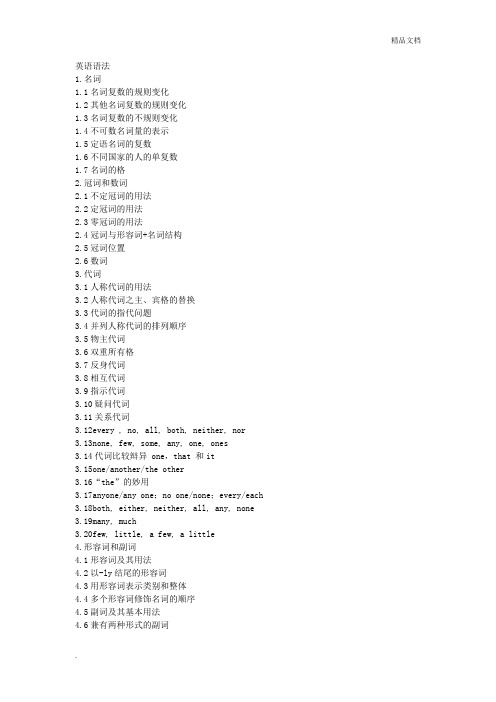
英语语法1.名词1.1名词复数的规则变化1.2其他名词复数的规则变化1.3名词复数的不规则变化1.4不可数名词量的表示1.5定语名词的复数1.6不同国家的人的单复数1.7名词的格2.冠词和数词2.1不定冠词的用法2.2定冠词的用法2.3零冠词的用法2.4冠词与形容词+名词结构2.5冠词位置2.6数词3.代词3.1人称代词的用法3.2人称代词之主、宾格的替换3.3代词的指代问题3.4并列人称代词的排列顺序3.5物主代词3.6双重所有格3.7反身代词3.8相互代词3.9指示代词3.10疑问代词3.11关系代词3.12every , no, all, both, neither, nor3.13none, few, some, any, one, ones3.14代词比较辩异 one,that 和it3.15one/another/the other3.16“the”的妙用3.17anyone/any one;no one/none;every/each 3.18both, either, neither, all, any, none 3.19many, much3.20few, little, a few, a little4.形容词和副词4.1形容词及其用法4.2以-ly结尾的形容词4.3用形容词表示类别和整体4.4多个形容词修饰名词的顺序4.5副词及其基本用法4.6兼有两种形式的副词4.7形容词与副词的比较级4.8as + 形容词或副词原级 + as 4.9比较级形容词或副词 + than 4.10可修饰比较级的词4.11many,old 和 far4.12the + 最高级 + 比较范围4.13和more有关的词组5.动词5.1系动词5.2什么是助动词5.3助动词be的用法5.4助动词have的用法5.5助动词do的用法5.6助动词shall和will的用法5.7助动词should和would的用法5.8短语动词5.9非谓语动词6.动名词6.1动名词作主语、宾语和表语6.2Worth的用法7动词不定式7.1不定式作宾语7.2不定式作补语7.3不定式主语7.4It's for sb.和 It's of sb.7.5不定式作表语7.6不定式作定语7.7不定式作状语7.8用作介词的to7.9省to 的动词不定式7.10动词不定式的否定式7.11不定式的特殊句型too…to…7.12不定式的特殊句型so as to 7.13不定式的特殊句型Why not 7.147不定式的时态和语态7.15动名词与不定式8.特殊词精讲8.1stop doing/to do8.2forget doing/to do8.3remember doing/to do8.4regret doing/to do8.5cease doing/to do8.6try doing/to do8.7go on doing/to do8.8be afraid doing/to do8.9be interested doing/to do 8.10mean to doing/to do8.11begin(start) doing/to do8.12感官动词 + doing/to do9.分词9.1分词作定语9.2分词作状语9.3连词+分词(短语)9.4分词作补语9.5分词作表语9.6分词作插入语9.7分词的时态9.8分词的语态10.独立主格10.1独立主格10.2With的复合结构11.动词的时态11.1一般现在时的用法11.2一般过去时的用法11.3used to / be used to 11.4一般将来时11.5be going to / will11.6be to和be going to11.7一般现在时表将来11.8用现在进行时表示将来11.9现在完成时11.10比较过去时与现在完成时11.11用于现在完成时的句型11.12比较since和for11.13since的四种用法11.14延续动词与瞬间动词11.15过去完成时11.16用一般过去时代替完成时11.17将来完成时11.18现在进行时11.19不用进行时的动词11.20过去进行时11.21将来进行时11.22一般现在时代替将来时11.23一般现在时代替过去时11.24一般现在时代替完成时11.25一般现在时代替完成时11.26一般现在时代替进行时11.27现在进行时代替将来时11.28时态一致1.29时态与时间状语12.动词的语态12.1Let的用法12.2短语动词的被动语态12.3表示"据说"或"相信" 的词组12.4不用被动语态的情况12.5主动形式表示被动意义12.6被动语态表示主动意义12.7need/want/require/worth13.句子的种类13.1句子的种类13.2感叹句结构13.3强调句结构13.4用助动词进行强调13.5反意疑问句14.倒装14.1倒装句之全部倒装14.2倒装句之部分倒装14.3以否定词开头作部分倒装14.4so, neither, nor作部分倒装14.5only在句首要倒装的情况14.6as, though 引导的倒装句14.7其他部分倒装15.主谓一致15.1并列结构作主语谓语用复数15.2主谓一致中的靠近原则15.3谓语动词与前面的主语一致15.4谓语需用单数15.5指代意义决定谓语的单复数15.6与后接名词或代词保持一致16.虚拟语气16.1真是条件句16.2非真实条件句16.3混合条件句16.4虚拟条件句的倒装16.5特殊的虚拟语气词:should 16.6wish的用法16.7比较if only与only if 16.8It is (high) time that16.9need "不必做"和"本不该做"17.名词性从句17.1引导名词性从句的连接词17.2名词性that-从句17.3名词性wh-从句17.4if, whether引导的名词从句17.5否定转移18.定语从句18.1关系代词引导的定语从句18.2关系副词引导的定语从句18.3判断关系代词与关系副词18.4限制性和非限制性定语从句18.5介词+关系词18.6as, which 非限定性定语从句18.7先行词和关系词二合一18.8what/whatever;that/what; who/whoever18.9关系代词that 的用法19.状语从句19.1地点状语从句19.2方式状语从句19.3原因状语从句19.4目的状语从句19.5结果状语从句19.6条件状语从句19.7让步状语从句19.8比较while, when, as19.9比较until和till19.10表示"一…就…"的结构20.连词20.1并列连词与并列结构20.2比较and和or20.3表示选择的并列结构20.4表示转折或对比20.5表原因关系20.6比较so和 such21.情态动词21.1情态动词的语法特征21.2比较can 和be able to21.3比较may和might21.4比较have to和must21.5比较have to和must21.6must表示推测21.7表示推测的用法21.8情态动词+ have +过去分词21.9should 和ought to21.10had better表示"最好"21.11would rather表示"宁愿"21.12will和would21.13情态动词的回答方式21.14带to 的情态动词21.15比较need和dare1.名词名词可以分为专有名词(Proper Nouns)和普通名词(Common Nouns),专有名词是某个(些)人,地方,机构等专有的名称,如Beijing,China等。
英语语法知识大全

英语语法知识大全一、词类与词性英语单词根据词性分为名词、动词、形容词、副词、代词、冠词、数词、介词、连词等。
每个单词的词性不同,其在句子中的作用和用法也各不相同。
二、动词时态与语态动词时态表示动作发生的时间和状态,包括现在时、过去时、将来时等。
动词语态则表示动作与主语之间的关系,分为主动语态和被动语态。
三、名词名词是表示人、事物、地点、时间等概念的词。
名词通常可分为可数名词和不可数名词,可数名词有单数和复数形式。
四、代词代词是代替名词的词,分为人称代词、物主代词、反身代词等。
代词在句子中可以作主语、宾语、表语等成分。
五、形容词与副词形容词是用来修饰名词或代词的词,表示人或事物的性质和特征。
副词是用来修饰动词、形容词或其它副词的词,表示动作的方式、程度等。
六、冠词与数词冠词是用来限定名词的词,分为不定冠词和定冠词。
数词是用来表示数量或顺序的词,包括基数词和序数词。
七、连词与介词连词是用来连接单词、短语或句子的词,分为并列连词和从属连词。
介词是用来连接名词或代词与动词、形容词等之间的词。
八、句子结构与类型英语句子结构分为简单句、并列句和复合句。
简单句由一个主语和一个谓语构成,并列句由两个或两个以上的简单句并列而成,复合句由一个主句和一个或多个从句构成。
九、主谓一致主谓一致是指主语和谓语在人称和数上保持一致。
一般情况下,单数主语使用单数谓语,复数主语使用复数谓语。
但在一些特殊情况下,主语和谓语的一致性需要进行特殊处理。
十、疑问句与否定句疑问句是用来提出问题的句子,否定句则是用来表达否定的观点或事实的句子。
疑问句和否定句的结构不同于陈述句,需要根据语法规则进行变化。
十一、从句与关系词从句是指用一个句子来修饰另一个句子的子句,分为名词性从句、定语从句和状语从句等。
关系词是用来引导从句的词,根据从句的类型不同,关系词的种类和使用方法也不同。
十二、虚拟语气与情态动词虚拟语气是一种表达假设条件或主观愿望的语气,情态动词则是用来表达可能性、意愿等的动词。
英语常考知识点梳理_常考知识点总结
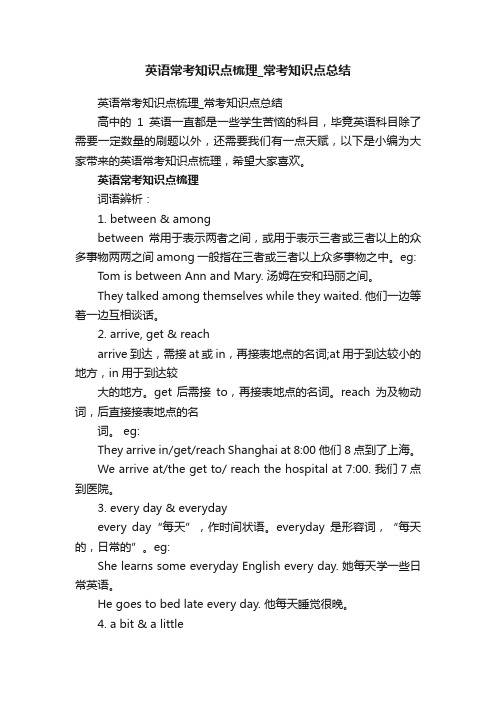
英语常考知识点梳理_常考知识点总结英语常考知识点梳理_常考知识点总结高中的1英语一直都是一些学生苦恼的科目,毕竟英语科目除了需要一定数量的刷题以外,还需要我们有一点天赋,以下是小编为大家带来的英语常考知识点梳理,希望大家喜欢。
英语常考知识点梳理词语辨析:1. between & amongbetween 常用于表示两者之间,或用于表示三者或三者以上的众多事物两两之间among一般指在三者或三者以上众多事物之中。
eg: Tom is between Ann and Mary. 汤姆在安和玛丽之间。
They talked among themselves while they waited. 他们一边等着一边互相谈话。
2. arrive, get & reacharrive到达,需接at或in,再接表地点的名词;at用于到达较小的地方,in用于到达较大的地方。
get 后需接to,再接表地点的名词。
reach为及物动词,后直接接表地点的名词。
eg:They arrive in/get/reach Shanghai at 8:00 他们8点到了上海。
We arrive at/the get to/ reach the hospital at 7:00. 我们7点到医院。
3. every day & everydayevery day“每天”,作时间状语。
everyday是形容词,“每天的,日常的”。
eg:She learns some everyday English every day. 她每天学一些日常英语。
He goes to bed late every day. 他每天睡觉很晚。
4. a bit & a littlea bit 修饰不可数名词后常常跟of 短语,not a bit 表示“一点也不(not at all)”。
a little 可直接修饰不可数名词,not a little则表示“非常;很(very/quite)”。
初中英语中考必考知识点

初中英语中考必考知识点一、语法知识(一)名词1. 可数名词与不可数名词可数名词有单复数形式。
复数形式的构成规则有:一般在词尾加 -s,如book books。
以s, x, ch, sh结尾的词加 -es,如box boxes。
以辅音字母 + y结尾的词,变y为i加 -es,如city cities;但以元音字母+y 结尾的词,直接加 -s,如day days。
以f或fe结尾的词,变f或fe为v加 -es,如knife knives,但也有一些词直接加 -s,如roof roofs。
不可数名词没有复数形式,常见的不可数名词有:water, milk, air, food(表示食物的总称时)等。
2. 名词所有格有生命的名词所有格:一般在词尾加's,如Tom's book。
以s结尾的复数名词,只加',如the students' classroom。
表示两者或两者以上共同拥有时,只在最后一个名词后加's;表示各自拥有时,每个名词后都加's。
例如:Lucy and Lily's mother(她们共同的妈妈);Lucy's and Lily's rooms(她们各自的房间)。
无生命的名词所有格常用“of + 名词”结构,如the window of the room。
(二)代词1. 人称代词主格:I, you, he, she, it, we, you, they,在句中作主语。
例如:I like English.宾格:me, you, him, her, it, us, you, them,在句中作宾语。
例如:He helps me.2. 物主代词形容词性物主代词:my, your, his, her, its, our, your, their,后面要接名词。
例如:This is my book.名词性物主代词:mine, yours, his, hers, its, ours, yours, theirs,相当于“形容词性物主代词+名词”。
初中英语各学期知识点总结
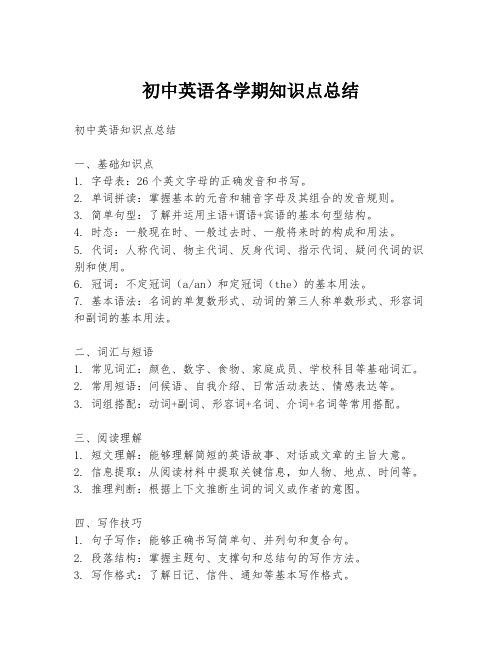
初中英语各学期知识点总结初中英语知识点总结一、基础知识点1. 字母表:26个英文字母的正确发音和书写。
2. 单词拼读:掌握基本的元音和辅音字母及其组合的发音规则。
3. 简单句型:了解并运用主语+谓语+宾语的基本句型结构。
4. 时态:一般现在时、一般过去时、一般将来时的构成和用法。
5. 代词:人称代词、物主代词、反身代词、指示代词、疑问代词的识别和使用。
6. 冠词:不定冠词(a/an)和定冠词(the)的基本用法。
7. 基本语法:名词的单复数形式、动词的第三人称单数形式、形容词和副词的基本用法。
二、词汇与短语1. 常见词汇:颜色、数字、食物、家庭成员、学校科目等基础词汇。
2. 常用短语:问候语、自我介绍、日常活动表达、情感表达等。
3. 词组搭配:动词+副词、形容词+名词、介词+名词等常用搭配。
三、阅读理解1. 短文理解:能够理解简短的英语故事、对话或文章的主旨大意。
2. 信息提取:从阅读材料中提取关键信息,如人物、地点、时间等。
3. 推理判断:根据上下文推断生词的词义或作者的意图。
四、写作技巧1. 句子写作:能够正确书写简单句、并列句和复合句。
2. 段落结构:掌握主题句、支撑句和总结句的写作方法。
3. 写作格式:了解日记、信件、通知等基本写作格式。
五、听力与口语1. 听力理解:能够理解日常对话和简短故事的主要内容。
2. 口语表达:能够用英语进行简单的自我介绍、日常交流和描述事物。
3. 发音练习:注意单词的正确发音和句子的语音语调。
六、语法进阶1. 现在进行时:表示正在进行的动作或状态。
2. 过去进行时:描述过去某一时刻正在进行的动作。
3. 一般过去时:描述过去发生的动作或状态。
4. 现在完成时:表示过去发生的动作对现在的影响或结果。
5. 比较级和最高级:形容词和副词的比较级和最高级的构成和用法。
6. 情态动词:can, could, may, might, must, should等的用法。
7. 宾语从句:陈述句、一般疑问句和特殊疑问句作宾语的用法。
(完整版)初中英语常考知识点集锦

初中英语常考知识点集锦1.across from 在。
.。
.。
对面。
例如:The shop is across from the bank.2。
be strict with“对...要求严格”3。
be interested in对。
.感兴趣4。
be surprised at对.。
感到惊讶;to one's surprise令某人惊讶的是;5. learn from sb。
向某人学习;6。
depend on依靠7.at the same time同时all the time总是,一直at this/that time在这时/那时8。
at the age of。
在.。
岁的时候9.be away from。
.。
远离。
.。
/从。
离开10.make a mistake犯错误。
make an excuse找借口。
11.make friends with sb.和某人交友make a noise制造噪音12.people(all over the world/around the world)全世界人13。
agree with sb.同意某人的观点14。
belong to属于15.stop/keep/prevent sb。
from doing sth.阻止某人做某事16。
as long as只要17.be like/look like"。
...怎么样”18.hear from sb。
= receive a letter/message from sb.收到某人的来信;write to sb。
= write a letter from sb。
;hear of 听说;hear about 听到关于。
.。
..的情况19.be good at擅长于be good for对。
有益;be good to对…友好20.work hard at在某方面努力工作21.have/take lessons上课22.do well in在某方面做得好23.be proud of因什么而感到自豪24think of/think about。
史上最全的英语语法大全(精心整理)
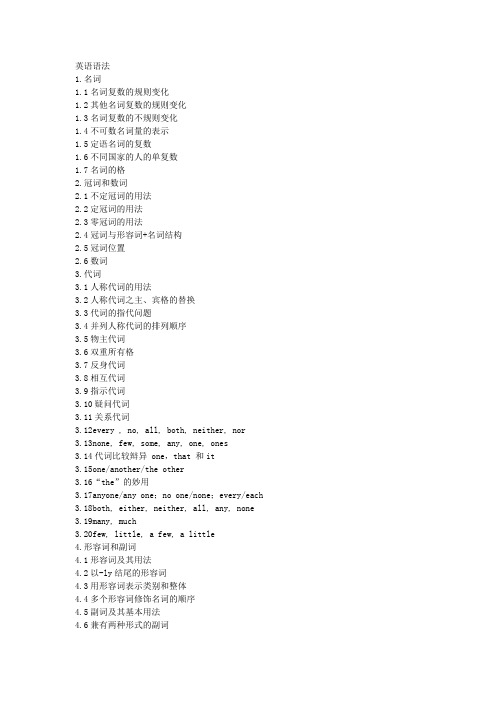
英语语法1.名词1.1名词复数的规则变化1.2其他名词复数的规则变化1.3名词复数的不规则变化1.4不可数名词量的表示1.5定语名词的复数1.6不同国家的人的单复数1.7名词的格2.冠词和数词2.1不定冠词的用法2.2定冠词的用法2.3零冠词的用法2.4冠词与形容词+名词结构2.5冠词位置2.6数词3.代词3.1人称代词的用法3.2人称代词之主、宾格的替换3.3代词的指代问题3.4并列人称代词的排列顺序3.5物主代词3.6双重所有格3.7反身代词3.8相互代词3.9指示代词3.10疑问代词3.11关系代词3.12every , no, all, both, neither, nor3.13none, few, some, any, one, ones3.14代词比较辩异 one,that 和it3.15one/another/the other3.16“the”的妙用3.17anyone/any one;no one/none;every/each 3.18both, either, neither, all, any, none 3.19many, much3.20few, little, a few, a little4.形容词和副词4.1形容词及其用法4.2以-ly结尾的形容词4.3用形容词表示类别和整体4.4多个形容词修饰名词的顺序4.5副词及其基本用法4.6兼有两种形式的副词4.7形容词与副词的比较级4.8as + 形容词或副词原级 + as 4.9比较级形容词或副词 + than 4.10可修饰比较级的词4.11many,old 和 far4.12the + 最高级 + 比较范围4.13和more有关的词组5.动词5.1系动词5.2什么是助动词5.3助动词be的用法5.4助动词have的用法5.5助动词do的用法5.6助动词shall和will的用法5.7助动词should和would的用法5.8短语动词5.9非谓语动词6.动名词6.1动名词作主语、宾语和表语6.2Worth的用法7动词不定式7.1不定式作宾语7.2不定式作补语7.3不定式主语7.4It's for sb.和 It's of sb.7.5不定式作表语7.6不定式作定语7.7不定式作状语7.8用作介词的to7.9省to 的动词不定式7.10动词不定式的否定式7.11不定式的特殊句型too…to…7.12不定式的特殊句型so as to 7.13不定式的特殊句型Why not 7.147不定式的时态和语态7.15动名词与不定式8.特殊词精讲8.1stop doing/to do8.2forget doing/to do8.3remember doing/to do8.4regret doing/to do8.5cease doing/to do8.6try doing/to do8.7go on doing/to do8.8be afraid doing/to do8.9be interested doing/to do 8.10mean to doing/to do8.11begin(start) doing/to do8.12感官动词 + doing/to do9.分词9.1分词作定语9.2分词作状语9.3连词+分词(短语)9.4分词作补语9.5分词作表语9.6分词作插入语9.7分词的时态9.8分词的语态10.独立主格10.1独立主格10.2With的复合结构11.动词的时态11.1一般现在时的用法11.2一般过去时的用法11.3used to / be used to 11.4一般将来时11.5be going to / will11.6be to和be going to11.7一般现在时表将来11.8用现在进行时表示将来11.9现在完成时11.10比较过去时与现在完成时11.11用于现在完成时的句型11.12比较since和for11.13since的四种用法11.14延续动词与瞬间动词11.15过去完成时11.16用一般过去时代替完成时11.17将来完成时11.18现在进行时11.19不用进行时的动词11.20过去进行时11.21将来进行时11.22一般现在时代替将来时11.23一般现在时代替过去时11.24一般现在时代替完成时11.25一般现在时代替完成时11.26一般现在时代替进行时11.27现在进行时代替将来时11.28时态一致1.29时态与时间状语12.动词的语态12.1Let的用法12.2短语动词的被动语态12.3表示"据说"或"相信" 的词组12.4不用被动语态的情况12.5主动形式表示被动意义12.6被动语态表示主动意义12.7need/want/require/worth13.句子的种类13.1句子的种类13.2感叹句结构13.3强调句结构13.4用助动词进行强调13.5反意疑问句14.倒装14.1倒装句之全部倒装14.2倒装句之部分倒装14.3以否定词开头作部分倒装14.4so, neither, nor作部分倒装14.5only在句首要倒装的情况14.6as, though 引导的倒装句14.7其他部分倒装15.主谓一致15.1并列结构作主语谓语用复数15.2主谓一致中的靠近原则15.3谓语动词与前面的主语一致15.4谓语需用单数15.5指代意义决定谓语的单复数15.6与后接名词或代词保持一致16.虚拟语气16.1真是条件句16.2非真实条件句16.3混合条件句16.4虚拟条件句的倒装16.5特殊的虚拟语气词:should 16.6wish的用法16.7比较if only与only if 16.8It is (high) time that16.9need "不必做"和"本不该做"17.名词性从句17.1引导名词性从句的连接词17.2名词性that-从句17.3名词性wh-从句17.4if, whether引导的名词从句17.5否定转移18.定语从句18.1关系代词引导的定语从句18.2关系副词引导的定语从句18.3判断关系代词与关系副词18.4限制性和非限制性定语从句18.5介词+关系词18.6as, which 非限定性定语从句18.7先行词和关系词二合一18.8what/whatever;that/what; who/whoever18.9关系代词that 的用法19.状语从句19.1地点状语从句19.2方式状语从句19.3原因状语从句19.4目的状语从句19.5结果状语从句19.6条件状语从句19.7让步状语从句19.8比较while, when, as19.9比较until和till19.10表示"一…就…"的结构20.连词20.1并列连词与并列结构20.2比较and和or20.3表示选择的并列结构20.4表示转折或对比20.5表原因关系20.6比较so和 such21.情态动词21.1情态动词的语法特征21.2比较can 和be able to21.3比较may和might21.4比较have to和must21.5比较have to和must21.6must表示推测21.7表示推测的用法21.8情态动词+ have +过去分词21.9should 和ought to21.10had better表示"最好"21.11would rather表示"宁愿"21.12will和would21.13情态动词的回答方式21.14带to 的情态动词21.15比较need和dare1.名词名词可以分为专有名词(Proper Nouns)和普通名词(Common Nouns),专有名词是某个(些)人,地方,机构等专有的名称,如Beijing,China等。
英语知识清单

英语知识清单第一部分基础知识1.字母:26个字母的大小写A B C D E F G H I J K L M N O P Q R S T U VW X YZa b c d ef gh i j k l m no p qr s t u v wx y z2.音标:48个音标3.词汇:词汇量,近反义词4.句子:大小写,标点符号第二部分语法知识(一)名词单复数1.一般情况,直接加-s,如:b o o k-b o o k s,b a g-b a g s,c a t-c a t s,b e d-b e d s2.以s.x.s h.c h结尾,加-e s,如:b u s-b u s e s,b o x-b o x e s,b r u s h-b r us h es,wa tc h-wa t c h e s3.以“辅音字母+y”结尾,变y为i,再加-e s,如:f am i l y-f am i l i e s, s t r a wb e r r y-s t r a wb e r r i e s4.以“f或f e”结尾,变f或f e为v,再加-e s,如:k n i f e-k n i v e s5.不规则名词复数:m a n-m en,wom a n-w om en,p o l i c em a n-p o l i c e m e n,p o l i c e w o m a n-p o l i c e wo m e n, m o us e-m i c ec h i l d-c h i ld re n,f o ot-f eet,t o ot h-t e e t h,f i s h-f i s h,p e o p l e-p e o p l e, C h i n es e-C h i ne s e,J a p a ne s e-J a p a n e s e不可数名词的复数就是原型:p a pe r,j u i c e,wa t e r, m i l k,r i c e,t e a(二)名词的格(1)有生命的东西的名词所有格:a)单数后加’s如:L uc y’s r u l er m y f a t h e r’s s h i r tb)以s结尾的复数名词后加’如:h i s f r i e n d s’b a g sc)不以s结尾的复数后加’s c h i l d r e n’s s h o e s并列名词中,如果把’s加在最后一个名词后,表示共有,如:T om a n d M i k e’s c ar汤姆和迈克共有的小汽车要表示所有物不是共有的,应分别在并列名词后加’sT om’s a n d M i k e’s c a r s汤姆和麦克各自的小汽车(2)表示无生命东西的名词通常用“of+名词”来表示所有关系:如:a p i c t u r e o f t h e c l a s s r o om a m a p of C h i n a(1)不定冠词:a /an元音开头的可数名词前用a n :a n e g g / a n a p pl e / a n or a n g e / a n e r as e r / a n a n s we r / a n I D c a r d / a n a l a rm c l oc k / a n ac t or / a n ac t r es s / a n e-m a i l / a n a d d r e s s / a n e v e nt/a n e x am p l e /a n o p e r a /a n h o u r a n o l d m a n/a n i n t e r e s t i n g bo o k/a n e xc i t i n g s p o r t/a n a c t i o n m o v i e/a n a r t l e s s o n/(2)定冠词:t h e定冠词的用法:(1)特指某(些)人或某(些)物:T h e r u l e r i s o n t h e d e s k.(2)复述上文提到的人或物:H e h a s a s we a t e r.T h e s w e a t e r i s n e w.(3)谈话双方都知道的人或物:T h e b o y s a r e n’t a t s c h o o l.(4)在序数词前:J oh n’s b i r t h d a y i s F eb r u a r y t h e s e c o n d.(5)用于固定词组中:i n t h e m o r n i n g/a f t e r n o o n/e v e n i n g不用冠词的情况:(1)专有名词前:Ch i n a i s a b i g c o u nt r y.(2)名词前有定语:t h i s,t h a t, m y ,yo u r,s om e,a n y ,n o等:T h i s i s m y b as e b a l l.(3)复数名词表示一类人和事:M o n k e y s c a n’t s wi m.T h e y a r e t e ac h e r s.(4)在节日,日期,月份,季节前:T o d a y i s C h r i s tm a s D a y.I t’s S u n d a y.(5)一日三餐前:W e h a v e b r e ak f a s t at6:30.(6)球类棋类运动前:T he y o f t e n p l a y f o o t b a l l a f t e r c l a s s.H e p l a y s c he s s at h om e.*但乐器前要用定冠词:I p l a y t h e g u i t a r v e r y we l l.(7)学科名称前:My f a v o r i t e s u b j ec t i s m u s i c.(8)在称呼或头衔的名词前:T h i s i s Mr L i.(9)固定词组中:at n o on at n i g ht b y b u s代词:人称代词,物主代词人称代词物主代词主格宾格第一人称单数I(我)m e m y(我的)复数we(我们)us ou r(我们的)第二人称单数y o u(你)y o u y o ur(你的)复数y o u(你们)y o u y o u r(你们的)第三人称单数h e(他)hi m h i s(他的)s h e(她)he r he r(她的)i t(它)i t i t s(它的)复数t h e y(他们/她们/它们)t h em t h e i r(他们的/她们的/它们的)形容词,副词:比较级,最高级(一)、形容词的比较级1、形容词比较级在句子中的运用:两个事物或人的比较用比较级,比较级后面一般带有单词t h a n。
史上最全278个英语常考知识点总结
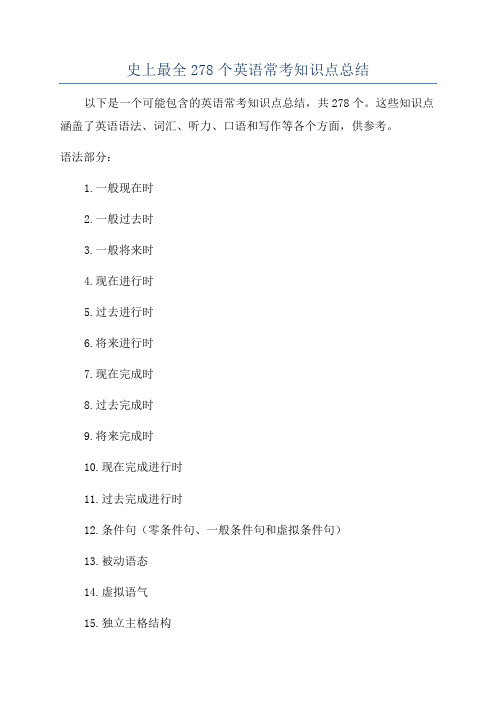
史上最全278个英语常考知识点总结以下是一个可能包含的英语常考知识点总结,共278个。
这些知识点涵盖了英语语法、词汇、听力、口语和写作等各个方面,供参考。
语法部分:1.一般现在时2.一般过去时3.一般将来时4.现在进行时5.过去进行时6.将来进行时7.现在完成时8.过去完成时9.将来完成时10.现在完成进行时11.过去完成进行时12.条件句(零条件句、一般条件句和虚拟条件句)13.被动语态14.虚拟语气15.独立主格结构16.动名词和不定式17.直述句、疑问句、祈使句和感叹句18.复合句(定语从句、状语从句、宾语从句和主语从句)19.连词的用法20.比较级和最高级词汇部分:21.常用动词和词组22.常用形容词和副词23.常用名词和短语24.天气和季节词汇25.食物和饮料词汇26.交通工具词汇27.数字和数量词28.颜色词汇29.时态和时间词汇30.国家和地理词汇听力部分:31.听力技巧和策略32.英语音标和发音33.主题词和关键词的听懂和理解34.对话和短文的主旨和细节35.记笔记和提问技巧口语部分:36.日常用语和问候语37.介绍自己和他人38.问路和指路39.餐厅和购物用语写作部分:41.英语书信写作和电子邮件42.描述人物和地点43.描述事件和经历44.写作技巧和结构45.链接词和过渡词的使用阅读部分:46.阅读技巧和策略47.主题和主旨的理解48.细节和推理的理解49.利用上下文猜词义50.阅读速度和理解力的提高文学部分:51.英美文学史和重要作品欣赏52.作家和作品的介绍和分析53.小说、诗歌和戏剧的题材和风格54.文学名句和典故的理解文化部分:55.国家和社会的概况56.历史和政治文化57.传统和习俗文化58.宗教和价值观文化59.艺术和娱乐文化60.节日和庆典文化其他部分:61.单词拼写和词汇运用62.输入法和排版技巧63.语法错误和修正64.句子结构和修辞手法65.语法错误和修正66.语法错误和修正67.句子结构和修辞手法68.书面和口头表达的准确性69.单词和句子的语法和语义70.考试技巧和策略。
中考英语必考词汇考点集锦
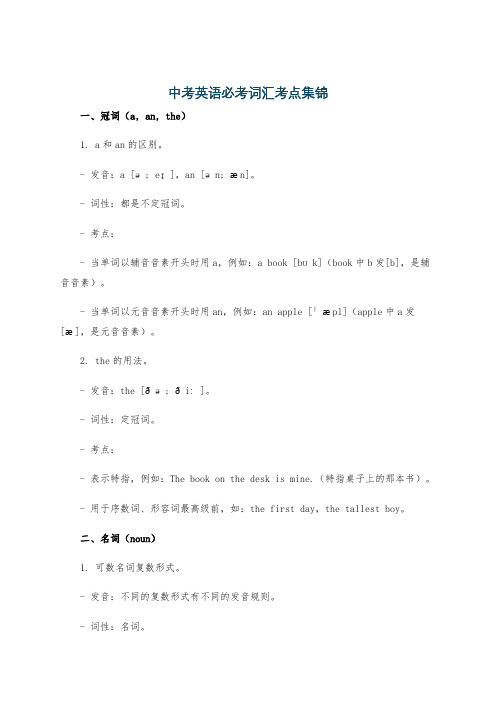
中考英语必考词汇考点集锦一、冠词(a, an, the)1. a和an的区别。
- 发音:a [ə; eɪ],an [ən; æn]。
- 词性:都是不定冠词。
- 考点:- 当单词以辅音音素开头时用a,例如:a book [bʊk](book中b发[b],是辅音音素)。
- 当单词以元音音素开头时用an,例如:an apple [ˈæpl](apple中a发[æ],是元音音素)。
2. the的用法。
- 发音:the [ðə; ðiː]。
- 词性:定冠词。
- 考点:- 表示特指,例如:The book on the desk is mine.(特指桌子上的那本书)。
- 用于序数词、形容词最高级前,如:the first day,the tallest boy。
二、名词(noun)1. 可数名词复数形式。
- 发音:不同的复数形式有不同的发音规则。
- 词性:名词。
- 考点:- 一般情况加 -s,读音:清辅音后读[s],如books [bʊks];浊辅音和元音后读[z],如dogs [dɒgz]。
- 以s, x, ch, sh结尾加 -es,读[ɪz],如boxes [ˈbɒksɪz]。
- 以辅音字母 + y结尾,变y为i加 -es,读[z],如babies [ˈbeɪbɪz]。
- 以f或fe结尾,变f或fe为v加 -es,如leaves [liːvz](leaf的复数)。
2. 不可数名词。
- 发音:根据单词本身而定。
- 词性:名词。
- 考点:- 不可数名词没有复数形式,如water [ˈwɔːtə(r)],不能说waters。
- 表示数量时,用量词,如a glass of water。
三、代词(pronoun)1. 人称代词主格和宾格。
- 发音:- I [aɪ](主格),me [miː](宾格)。
- he [hiː](主格),him [hɪm](宾格)。
- she [ʃiː](主格),her [hɜː(r)](宾格,同时her也是形容词性物主代词)。
英语常考知识点总结279个

英语常考知识点总结279个1 see、hear 、notice 、find 、feel 、listen to 、look at (感官动词)+do eg:I like watching monkeys jump2(比较级and 比较级) 表示越来越怎么样3 a piece of cake =easy 小菜一碟(容易)4 agree with sb 赞成某人5 all kinds of 各种各样 a kind of 一种6 all over the world = the whole world 整个世界7 along with同……一道,伴随……e g : I will go along with you我将和你一起去The students planted trees along with their teachers 学生同老师们一起种树8 As soon as 一怎么样就怎么样9 as you can see 你是知道的10 ask for ……求助向…要…(直接接想要的东西) eg : ask you for my book11 ask sb for sth 向某人什么12 ask sb to do sth 询问某人某事ask sb not to do 叫某人不要做某事13 at the age of 在……岁时eg:I am sixteen I am at the age of sixteen14 at the beginning of …… ……的起初;……的开始15 at the end of +地点/+时间最后;尽头;末尾eg : At the end of the day16 at this time of year 在每年的这个时候17 be /feel confident of sth /that clause +从句感觉/对什么有信心,自信eg : I am / feel confident of my spoken English I feel that I can pass the test18 be + doing 表:1 现在进行时2 将来时19 be able to (+ v 原) = can (+ v 原) 能够……eg : She is able to sing She can sing20 be able to do sth 能够干什么eg :she is able to sing21 be afraid to do (of sth) 恐惧,害怕……eg : I’m afra id to go out at night I’m afraid of dog22 be allowed to do 被允许做什么eg: I’m allowed to watch TV 我被允许看电视I should be allowed to watch TV 我应该被允许看电视23 be angry with sb 生某人的气eg : Don’t be angry with me24 be angry with(at) sb for doing sth 为什么而生某人的气25 be as…原级…as 和什么一样eg : Sheis as tall as me 她和我一样高26 be ashamed to27 be away from 远离28 be away from 从……离开29 be bad for 对什么有害eg : Reading books in the sun is bad for your eyes 在太阳下看书对你的眼睛不好30 be born 出生于31 be busy doing sth 忙于做什么事be busy with sth 忙于……32 be careful 当心;小心33 be different from…… 和什么不一样34 be famous for 以……著名35 be friendly to sb 对某人友好36 be from = come from 来自eg :He is from Bejing He comes from Bejing Is he from Bejing ? Does he come from Bejing ?37 be full of 装满……的be filled with 充满eg: the glass is full of water the glass is filled with water38 be glad +to +do/从句39 be going to + v(原) 将来时40 be good at(+doing) = do well in 在某方面善长, 善于……41 be good for 对什么有好处eg : Reading aloud is good for your English42 be happy to do 很高兴做某事43 be helpful to sb 对某人有好处eg : Reading aloud is helpful to you 大声朗读对你有好处Exercising is helpful to your body 锻炼对你的身体有好处44 be in good health 身体健康45 be in trouble 处于困难中eg : She is in trouble They are in trouble46 be interested in 对某方面感兴趣47 be late for = come late to 迟到eg: Be late for class 上课迟到48 be like 像…… eg : I’m like my mother49 be mad at 生某人的气50 be made from 由……制成(制成以后看不见原材料)51 be made of 由……制成(制成以后还看得见原材料)52 be not sure 表不确定53 be on a visit to 参观54 be popular with sb 受某人欢迎55 be quiet 安静56 be short for 表**的缩写eg: 陶is short for 陶俊杰57 be sick in bed 生病在床58 be sorry to do sth be sorry for sb eg : I am sorry for you59 be sorry to hear that60 be sorry to trouble sb eg : I am sorry to trouble you61 be strict in doing sth 严于做某事eg : He’s strict in obeying roles62 be strict with sb 对某人要求严格eg: Some students are not strict with them selves 这些学生对自己不严格63 be strict with sb in sth 某方面对某人严格64 be supposed todo 被要求干什么65 be sure 表确定66 be sure of doing sth 对做某事有信心eg: He is sure of winning I am sure of learning English well67 be sure of sth 对做某事有信心eg: I’m sure of my head (my teacher 我相信我的大脑(老师)68 be sure that sth 对做某事有信心eg: I’m suer that he can pass the test 我相信他能通过考试69 be sure to do sth一定会做某事eg: We are sure to pass the test 我们一定会通过这次考试We are sure to learn English well 我们一定能学好英语70 be terrified of + 名/动doing 害怕……71 be terrified to do sth 害怕做某事72 be the same as … 和什么一样73 be used to doing sth 习惯做某事eg: My father is used to getting up early 我爸爸习惯早He is used to sleeping in class 他习惯上课睡觉74 be worth doing 值得做什么75 be(feel) afraid to do sth 害怕做某事be afraid of sth 害怕某物be afraid that 丛句76 because+句子because of +短语eg : He was late because he had a headache He was late because of his headache77 begin to do = start to do 开始做某事start…with…=begin…with… 以什么开始什么eg : Let’s begin the game with the song I begin to go home78 between…and… 两者之间79 borrow sth from sb 向……借……lend sth to sb ( lend sb sth 借给……什么东西eg : I borrowed a pen from him he lent a pen to me ( he lent me a pen80 both = the same(as) = not different(from) 表相同81 bother 打扰bother sb to do sth eg : I’m sorry to bother you ,but can you tell me to way to the station 我十分道歉打扰你,但是你能告诉我怎么去车站the problem has been bothering me for weeks 这个问题困扰了我几个周了He’s bothering me to lend him money82 by the end of 到……为止83 call sb sth eg : We call him old wang84 care 关心eg : Don’t you care about this country’s future ?你为什么不关心国家的未来85 catch up with sb 赶上某人86 chat with sb 和某人闲谈take sb to + 地点带某人去某地87 come in 进88 come over to 过来89 come up with 提出eg: Can you come up with a good idea你能想出一个好办法吗?90 communicate with sb 和某人交流91 consider + doing 考虑做什么eg : Why not consider going to lu zhou 为什么不考虑去泸州?92 dance to 随着……跳舞eg : She likes dancing to the music 她喜欢随着音乐跳舞93 decide to do sth 决定做某事94 do a survey of 做某方面的调查95 do better in 在……方面做得更好96 do wrong 做错97 Don’t forget to do sth 不要忘了做某事98 Don’t mind +doing /从句/名词不要介意……99 each +名(单)每一个…eg : Each student has many books 每一个学生都有一些书100 end up +doing101 enjoy +doing喜欢102 escape from 从……逃跑eg: The prisoners have escaped from the prison犯人从监狱里逃跑出来103 expect to do sth 期待做某事104 fall down 摔下来fall off 从哪摔下来105 fall in love with sb/sth 爱上什么106 far from 离某地远eg : The school is far from my home107 find +it +adj +to do 发现做某事怎么样108 find sb/sth +adj 发现什么怎么样eg : I find the book in teresting109 finish 完成+doing(名词)110 fit to sb = be fit for sb 适合某人111 forget to do 没有做而忘了forget doing 做了而又忘了eg: Don't forget to go home I forget closing door112 from…to… 从某某到某某eg: From me for her113 get /have sth down 做完,被(别人)做…eg: I have my hair cut我理了发(头发被剪了)Tom got his bad tooth pulled out 汤母把他的坏牙拔掉了(被牙医拔掉了)114 get a part-time job= find a part-time job115 get along well with sb = geton well with sb 与某人相处得好116 get along with sb = get on with sb 与某人相处117 get ready for = be ready for为什么而准备eg : I get ready for math /I am ready for math118 get sb in to trouble 给某人麻烦119 get sb to do sth120 get…from… 从某处得到某物121 give a talk 做报告eg: He is give a tall122 give sth to sb give sb sth 给某人某物123 go fishing 钓鱼go swimming 游泳124 go on to do 去做下一件事go on doing 继续做这件事125 go out away from go out of126 go to school 上学(用于专业的)go to the school 去学校(不一定是上学) 127 good way to 好方法128 hate to do 讨厌没做过的事hate doing 讨厌做过的事129 have a party for sb 举办谁的晚会130 have a talk 听报告谈一谈131 have been doing 现在完成进行时eg : You have been talking You have been sleeping since…..132 have been to …( 地方)……去过某过地方have gone to …(地方) 去了某地还没回来133 have fun +doing 玩得高兴134 have sth to do 有什么事要做eg: I have a lot of homework to do 我有很多家庭作业要做I have nothing to do 我没什么事情做135 have to do sth 必须做某事136 have trouble (problem) (in) doing sth 做什么事情有麻烦137 have…time +doing138 have…(时间)…off 放……假eg: I have month off 我请一个月得假139 hear sb +do/doing 听见某人做某事/正在做某事140 help a lot 很大用处141 help sb with sth \one’s sth 帮助某人某事(某方面) help sb(to) do sth 帮助某人做某事142 hope to do sth 希望做某事143 How about(+doing) = What about(+doing)144 how do you like = what do you think of 你对什么的看法145 if : 是否= wh ether eg: I don’t know if (w hether) I should go to the party 我不知道我是否应该去参加晚会He don't know if (whether) we will arrive on time tomorrow morning 他不知道我们明天早上是否能准时到达146 if :如果,假如(全部接一般时态)+条件语态从句eg: I’ll go to Lu Zhou if it does’t rain 假如明天不下雨,我就去泸州If they change the plan they will let me know 假如他们要改变计划,他们会让我知道的I'll go to England ,if I have enough money next year 如果我明年由足够的钱,我就要去英国147 in one's opinion = sb think 某人认为148 in some ways 在某些方面149 in the end = finally(adv) 最后150 in the north of… 什么在什么的北方(north 北south 南west 西east 东)151 in the sun 在太阳下152 increase 增加eg : They’ve increased the pr ice of petrol by 3% 他们把石油价增加了3% the population has increased from 12 million ten years ago to 18 million now153 instead of +(名) 代替eg: I’d like an apple i nstead of a pear 我想要苹果,而不要梨子I like English instead of math 我喜欢英语而不喜欢数学154 introduce sb to sb 介绍某人给某人introduce oneself 自我介绍155 invite sb to do sth 邀请某人做某事156 It takes sb sometime to do sth 做某人花掉某人多少时间eg : It took me 5 minutes to do my homework It takes me half an hour to cook157 It's +adj +for sb to do sth 对某人来说做某事怎么样158 It's +adj +to do 做某事怎么样159 It's +adj for sb 对于某人来说怎么样It's +adj of sb 对某人来说太怎么样160 It's +adj(for sb) to do(对某人来说) 做某事怎么样It's +adj of sb to do sth 对某人来说做某事太怎么样eg : It's nice of you to help me with my English 161 It's a good idea for sb to do sth 对…… 来说是个好主意162 It's important to sb 对某人来说很重要163 It's time to do sth It’s time for sth 到了该去做某事的时间eg : It's time to have class It’s time for class 该去上课了164 join = take part in 参加165 just now 刚才166 keep +sb /sth +adj /介词短语让什么保持什么样?167 keep out 不让…… 进入168 keep sb adj 让……保持…… eg: I want to keep my mother happy keep healthy 保持健康169 key to +名词表示:某物的钥匙或某题的答案170 key to… anser to … key 可以是答题或钥匙171 laugh at… 取笑…… eg : Don't la ugh at others We laughed at the joke 172 learn by oneslfe 自学173 learn from sb 向某人学习eg: We should learn from Lei Feng174 learn to do sth 学做某事175 let sb do sth 让某人做某事176 Let sb down 让某人失望eg :We shouldn't let our parents down 我们不应该让我们的父母失望177 live from :离某地远178 live in +大地方/at +小地方居住在某地eg: I live in Lu Zhou She lives at XuanTan179 look after = take care of 照顾照看180 lose one's way 谁迷路eg : Lose your way 你迷路181 make a decision to do sth 决定做某事182 make friends with sb 和谁成为朋友eg : I want to make friends with you 183 make it early 把时间定的早一点184 make on exhibition of oneself 让某人出洋相185 make sb /n +n 使什么成为什么186 make sb /sth +adj 使某人(某物)怎么样eg : You must made your bed clean187 make sb /sth adj 使某人/某物怎么样188 make sb do sth 让某人做某事eg : I made him write 我以前让他写189 make up be made up of (被动语态)由……组成190 make…difference to…191 mind sb to do mind one's doing 介意……做什么192 most +名most of +代194 must be 一定195 need +名词196 need sb do sth 需要某人做某事197 need to do (实义动词) need do (情态动词)198 no /neither of hate to do no /neither of hate doing199 no +名词200 not anymore = no more 再也不…… eg: He didn't cry anymore He cried no more 他再也不哭201 not… (形、副)at all eg: He’s not tall at all she doesn't junp far at all202 not…at all 一点都不203 not…either 表否定,也不eg : I don't japanse either Idon't have sister, either 我也没有姐姐204 not…until 直到……才…… eg: I didn't sleep until my mother came back The child didn't stop crying untilI give her sugar205 offer / provide sb with sth 给某人提供206 offer sb sth ( offer sth to sb 提供什么东西给某人eg : Ioffer you water (I offer water to you 我给你提供水207 on one's way to… 在谁去那的路上208 on the one hand 一方面on the other hand 另一方面209 on the phone = over the phone 用电话交谈210 on time 准时in time 及时211 one day =some day =someday 一天,有一天212 one of +可数名词的复数形式213 one to another 一个到另一个214 over and over again 一遍又一遍215 say to oneself 对自己说216 please +do217 please help yourself218 part-time job 兼职工作full-time job全职工作219 please with sb.220 pool into = pore into221 practice +doing222 prefer sth.to sth. 相对... 更喜欢223 pay for224 rather ...than 宁可....也不225 regard ... as 把.... 当作226 remind sb. about sth.227 remind sb. of sth.228 return sth. to sb.229 pretend to do sth. 装着去做什么230 say to sb. 对某人说231 sb. spend some money on sth. 花了多少钱在某事上232 sb. spend sometime with sb. 花了多少时间陪谁233 sb. spend sometime (in) doing sth.234 sb. with sb. +is sb and sb +are235 see sb do236 seem to do/be +adj. 显得怎么样237 send + sb sth238 send ...to ...239 shock 使... 震惊240 show sb sth241 show sb sth =show sth to sb242 show sth to sb243 some ... others 一些... 另一些244 start .. with... begin ...with..245 stay away from 远离246 stop doing 停下正在做的事247 stop to do sth 停下来正在做的事去做下一件事248 stop sb from doing sth 阻止某人做某事249 stop sb(from)dong 阻止某人做某事250 such +名251 suit sb 适合某人252 surprise sb 253 take classes254 take sb to 255 take walks=take a walk= go for a walk256 talk to 257 talk of258 talk with sb 259 tell sb to do sth260 tell sb not to do sth 261 tell a lie262 teach sb sth 263 tell ... from..264 thank you for doing265 the same +名词(doing)+as... 266 the same ...(名)...as267 the way to do sth=the way of doing sth268 the way to ...(地点)269 too.. to 270 transalte ... into.. . 271 travel with sb272 try to do sth 想干什么但没成功try doing sth 想干什么,已经做过了273 try one's best to do sth 尽某人最大的努力274 try ... 试衣服have a try 试一下275 turn down 开小turn up 开大276 turn off 关上turn on 打开277 upsidde down 倒着278 visit to 参观某个地方279 wait for sb 等某人。
史上最全!278个英语常考知识点总结-赶快收藏!

史上最全!278个英语常考知识点总结,赶快收藏!1 see、hear 、notice 、find 、feel 、listen to 、look at (感官动词)+do eg:I like watching monkeys jump2(比较级and 比较级) 表示越来越怎么样3 a piece of cake =easy 小菜一碟(容易)4 agree with sb 赞成某人5 all kinds of 各种各样a kind of 一样6 all over the world = the whole world 整个世界7 along with同……一道,伴随……eg : Iwill go along with you我将和你一起去the students planted trees along with their teachers 学生同老师们一起种树8 As soon as 一怎么样就怎么样9 as you can see 你是知道的10 ask for ……求助向…要…(直接接想要的东西) eg : ask you for my book11 ask sb for sth 向某人什么12 ask sb to do sth 询问某人某事ask sb not to do 叫某人不要做某事13 at the age of 在……岁时eg:I am sixteen I am at the age of sixteen14 at the beginning of …………的起初;……的开始15 at the end of +地点/+时间最后;尽头;末尾eg : At the end of the day16 at this time of year 在每年的这个时候17 be /feel confident of sth /that clause +从句感觉/对什么有信心,自信eg : I am / feel confident of my spoken English I feel that I can pass the test18 be + doing 表:1 现在进行时2 将来时19 be able to (+ v 原) = can (+ v 原) 能够……eg : She is able to sing She can sing20 be able to do sth 能够干什么eg :she is able to sing21 be afraid to do (of sth 恐惧,害怕……eg : I’m afraed togo out at night I’m afraid of dog22 be allowed to do 被允许做什么eg: I’m allowed to watch TV 我被允许看电视I should be allowedto watch TV 我应该被允许看电视23 be angry with sb 生某人的气eg : Don’t be angry with me24 be angry with(at) sb for doing sth 为什么而生某人的气25 be as…原级…as 和什么一样eg : Sheis as tall as me 她和我一样高26 be ashamed to27 be away from 远离28 be away from 从……离开29 be bad for 对什么有害eg : Reading books in the sun isbad for your eyes 在太阳下看书对你的眼睛不好30 be born 出生于31 be busy doing sth 忙于做什么事be busy with sth 忙于……32 be careful 当心;小心33 be different from……和什么不一样34 be famous for 以……著名35 befriendly to sb 对某人友好36 be from = come from 来自eg :Heis from Bejing He comes from Bejing Is he from Bejing ? Does he come fromBejing ?37 be full of 装满……的be filledwith 充满eg: the glass is full of water the glass isfilled with water38 be glad+to+do/从句39 be going to + v(原) 将来时40 be good at(+doing) = do well in 在某方面善长, 善于……41 be good for 对什么有好处eg : Reading aloud is good foryour English42 be happy to do 很高兴做某事43 be helpful to sb 对某人有好处eg : Reading aloud is helpful to you 大声朗读对你有好处Exercising is helpful to your bady 锻炼对你的身体有好处44 be in good health 身体健康45 be in trouble 处于困难中eg : She is in trouble They arein tronble46 be interested in 对某方面感兴趣47 be late for = come late to 迟到eg: Be late for class 上课迟到48 be like 像……eg : I’m like my mother49 be mad at 生某人的气50 be made from 由……制成(制成以后看不见原材料)51 be made of 由……制成(制成以后还看得见原材料)52 be not sure 表不确定53 be on a visit to 参观54 be popular with sb 受某人欢迎55 be quiet 安静56 be short for 表**的缩写eg: 陶is shortfor 陶俊杰57 be sick in bed 生病在床58 be sorry to do sth be sorryfor sb eg : I am sorry for you59 be sorry to hear that60 be sorry to trouble sb eg : I am sorry to troubleyou61 be strict in doing sth 严于做某事eg : He’s strict inobeying noles62 be strict with sb 对某人要求严格eg: Some students are notstrict with them selves 这些学生对自己不严格63 be strict with sb in sth 某方面对某人严格64 be supposed todo 被要求干什么65 be sure 表确定66 be sure of doing sth 对做某事有信心eg: He is sure of winning I am sure of learning English well67 be sure of sth 对做某事有信心eg: I’m sure of my head (myteacher 我相信我的大脑(老师)68 be sure that sth 对做某事有信心eg: I’m suer that he canpass the test 我相信他能通过考试69 be sure to do sth一定会做某事eg: We are sure to pass thetest 我们一定会通过这次考试We are sure to learn English well 我们一定能学好英语70 be terrified of + 名/动doing 害怕……71 be terrified to do sth 害怕做某事72 be the same as …和什么一样73 be used to doing sth 习惯做某事eg: My father is used to getting up early 我爸爸习惯早He isused to sleeping in class 他习惯上课睡觉74 be worth doing 值得做什么75 be(feel) afraid to do sth 害怕做某事be afraid of sth 害怕某物be afraid that 丛句76 because+句子because of +短语eg : He was late because he had a headache He was late because of his headache77 begin to do = start to do 开始做某事start…with…=begin…with…以什么开始什么eg : Let’s begin the game with the song I begin to go home78 between…and…两者之间79 borrow sth from sb 向……借……lend sth to sb ( lend sb sth 借给……什么东西eg : I borrowed a pen from him he lent a pen to me ( he lent me a pen80 both = the same(as) = not different(from) 表相同81 bother 打扰bother sb to do sth eg : I’m sorry to bother you ,but can you tell me to way to the station 我十分道歉打扰你,但是你能告诉我怎么去车站the problem has been bothering me for weeks 这个问题困扰了我几个周了He’s bothering me to lend him money82 by the end of 到……为止83 callsb sth eg : We call him old wang84 care 关心eg : Don’t you care about this country’s future ?你为什么不关心国家的未来85 catch up with sb 赶上某人86 chat with sb 和某人闲谈take sb to + 地点带某人去某地87 come in 进88 come over to 过来89 come up with 提出eg: Can you come up with a good idea你能想出一个好办法吗?90 communicate with sb 和某人交流91 consider + doing 考虑做什么eg : Why not consider going to lu zhou 为什么不考虑去泸州?92 dance to 随着……跳舞eg : Shelikes dancing to the music 她喜欢随着音乐跳舞93 decide to do sth 决定做某事94 do a survey of 做某方面的调查95 do better in 在……方面做得更好96 do wrong 做错97 Don’t forget to do sth 不要忘了做某事98 Don’t mind +doing /从句/名词不要介意……99 each +名(单)每一个…eg : Each student has many books 每一个学生都有一些书100 end up +doing101 enjoy +doing喜欢102 escape from 从……逃跑eg: Theprisoners have escaped from the prison犯人从监狱里逃跑出来103 expect to do sth 期待做某事104 fall down 摔下来fall off 从哪摔下来105 fall in love with sb/sth 爱上什么106 far from 离某地远eg : The school is far from my home107 find +it +adj +to do 发现做某事怎么样108 find sb/sth +adj 发现什么怎么样eg : I find the bookinteresting109 finish 完成+doing(名词)110 fit to sb = be fit for sb 适合某人111 forget to do 没有做而忘了forget doing 做了而又忘了eg: Don't forget to gohome I forget closing door112 from…to…从某某到某某eg: Fromme for her113 get /have sth down 做完,被(别人)做…eg: I have my hair cut我理了发(头发被剪了) Tom got his bad tooth pulled out 汤母把他的坏牙拔掉了(被牙医拔掉了)114 get a part-time job= find a part-time job115 get along well with sb = geton well with sb 与某人相处得好116 get along with sb = get on with sb 与某人相处117 getready for = be ready for为什么而准备eg : I get ready for mathI am ready for math118 get sb in to trouble 给某人麻烦119 get sb to do sth120 get…from…从某处得到某物121 give a talk 做报告eg: He is give a tall122 give sth to sb give sb sth 给某人某物123 go fish 钓鱼go swimming 游泳124 go on to do 去做下一件事go on doing 继续做这件事125 go out away from go out of126 go to school 上学(用于专业的)go to the school 去学校(不一定是上学)127 good way to 好方法128 hate to do 讨厌没做过的事hate doing 讨厌做过的事129 have a party for sb 举办谁的晚会130 have a talk 听报告谈一谈131 have been doing 现在完成进行时eg : You have been talkingYou have been sleeping since132 have been to …( 地方)……去过某过地方have gone to …(地方) 去了某地还没回来133 have fun +doing 玩得高兴134 have sth to do 有什么事要做eg: I have a lot of homework to do 我有很多家庭作业要做I havenothing to do 我没什么事情做135 have to do sth 必须做某事136 have trouble (problem) (in) doing sth 做什么事情有麻烦137 have…time +doing138 have…(时间)…off 放……假eg: I have month off 我请一个月得假139 hear sb +do/doing 听见某人做某事/正在做某事140 help a lot 很大用处141 help sb with sth \one’s sth 帮助某人某事(某方面) help sb(to) do sth 帮助某人做某事142 hope to do sth 希望做某事143 How about(+doing) = What about(+doing)144 how do you like = what do you think of 你对什么的看法145 if : 是否=wether eg: I don’t know if (wether) I should go to the party 我不知道我是否应该去参加晚会He don't know if (wether) we will arrive on time tomorrow morning 他不知道我们明天早上是否能准时到达146 if :如果,假如(全部接一般时态)+条件语态从句eg: I’ll go to LuZhou if it does’t rain 假如明天不下雨,我就去泸州If they change the plan they will let me know 假如他们要改变计划,他们会让我知道的I'll go to England ,if I have enough money next year 如果我明年由足够的钱,我就要去英国147 in one's opinion = sb think 某人认为148 in some ways 在某些方面149 in the end = finally(adv) 最后150 in the north of…什么在什么的北方(north 北sowth 南west 西east东)151 in the sun 在太阳下152 increase 增加eg : They’ve increased the prece of petrol by 3% 他们把石油价增加了3% the population has increased from 12 million ten years ago to 18 million now 153 instead of +(名) 代替eg: I’d like an apple instead of a pear 我想要苹果,而不要梨子I like English instead of math 我喜欢英语而不喜欢数学154 introduce sb to sb 介绍某人给某人introduce oneself 自我介绍155 invite sb to do sth 邀请某人做某事156 It takes sb sometime to do sth 做某人花掉某人多少时间eg : It took me 5 minutes to do my homework It takes me half an hour to cook157 It's +adj +for sb to do sth 对某人来说做某事怎么样158 It's +adj +to do 做某事怎么样159 It's +adj for sb 对于某人来说怎么样It's +adj of sb 对某人来说太怎么样160 It's +adj(for sb) to do(对某人来说) 做某事怎么样It's +adj ofsb to do sth 对某人来说做某事太怎么样eg : It's nice of you to help me with my English161 It's a good idea for sb to do sth 对……来说是个好主意162 It's important to sb 对某人来说很重要eg: It's important tome163 It's time to do sth It’s time for sth 到了该去做某事的时间eg : It's time to have class It’s time for class 该去上课了164 join = take part in 参加165 just now 刚才166 keep +sb /sth +adj /介词短语让什么保持什么样?167 keep out 不让……进入168 keep sb adj 让……保持……eg: Iwant to keep my mother happy keep healthy 保持健康169 key to +名词表示:某物的钥匙或某题的答案170 key to…anser to …key 可以是答题或钥匙171 laugh at…取笑……eg : Don't langh at others Welanghed at the joke172 learn by oneslfe 自学173 learn from sb 向某人学习eg: We should learn from LeiFeng174 learn to do sth 学做某事175 let sb do sth 让某人做某事176 Let sb down 让某人失望eg :Weshouldn't let our farents down 我们不应该让我们的父母失望177 live from :离某地远178 live in +大地方/at +小地方居住在某地eg: I live in LuZhou She lives at XuanTan 179 look after = take care of 照顾照看180 lose one's way 谁迷路eg : Lose your way 你迷路181 make a decision to do sth 决定做某事182 make friends with sb 和谁成为朋友eg : I want to makefriends with you183 make it early 把时间定的早一点184 make on exhibition of oneself 让某人出洋相185 make sb /n +n 使什么成为什么eg : I made her my stepmoller I made you my wife 186 make sb /sth +adj 使某人(某物)怎么样eg : You must madeyour bed clean187 make sb /sth adj 使某人/某物怎么样188 make sb do sth 让某人做某事eg : I made him write 我以前让他写189 make up be made up of (被动语态)由……组成190 make…difference to…191 mind sb to do mind one's doing 介意……做什么192 most +名most of +代193 much too +形容词194 must be 一定195 need +名词196 need sb do sth 需要某人做某事197 need to do (实义动词) need do (情态动词)198 no /neithr of hate to do no /neithr of hate doing199 no +名词200 not anymore = no more 再也不……eg: He didn't cry anymore He cried no more 他再也不哭201 not…(形、副)at all eg: He’s not tall at all she doesn't junp far at all202 not…at all 一点都不203 not…either 表否定,也不eg : I don't japanse either Idon't have sister, either 我也没有姐姐204 not…until 直到……才……eg: I didn't sleep until my mother came back The child didn't stop crying untilI give her sugar205 offer / provide sb with sth 给某人提供206 offer sb sth ( offer sth to sb 提供什么东西给某人eg : Ioffer you water (I offer water to you 我给你提供水207 on one's way to…在谁去那的路上208 on the one hand 一方面on the other hand 另一方面209 on the phone = over the phone 用交谈210 on time 准时in time 与时211 one day =some day =someday 一天,有一天212 one of +可数名词的复数形式213 one to another 一个到另一个214 over and over again 一遍又一遍215 say to oneself 对自己说216 please +do217 please hepl yourself218 part-time job 兼职工作full-time job全职工作219 please with sb.220 pool into = pore into221 practice +doing222 prefer sth.to sth. 相对... 更喜欢223 pay for224 rather ...than 宁可....也不225 regard ... as 把.... 当作226 remind sb. about sth.227 remind sb. of sth.228 return sth. to sb.229 pretend to do sth. 装着去做什么230 say to sb. 对某人说231 sb. spend some money on sth. 花了多少钱在某事上232 sb. spend sometime with sb. 花了多少时间陪谁233 sb. spend sometime (in) doing sth.234 sb. with sb. +is sb and sb +are235 see sb do236 seem to do/be +adj. 显得怎么样238 send ...to ...239 shock 使... 震惊240 show sb sth241 show sb sth =show sth to sb242 show sth to sb243 some ... others 一些... 另一些244 start .. with... begin ...with..245 stay away from 远离246 stop doing 停下正在做的事247 stop to do sth 停下来正在做的事去做下一件事248 stop sb from doing sth 阻止某人做某事249 stop sb(from)dong 阻止某人做某事250 such +名251 suit sb 适合某人252 surprise sb253 take classes254 take sb to255 take walks=take a walk= go for a walk256 talk to257 talk of258 talk with sb260 tell sb not to do sth261 tell a lie262 teach sb sth263 tell ... from..264 thank you for doing265 the same +名词(doing)+as...266 the same ...(名)...as267 the way to do sth=the way of doing sth268 the way to ...(地点)269 too.. to270 transalte ... into...271 travel with sb272 try to do sth 想干什么但没成功try doing sth 想干什么,已经做过了273 try one's best to do sth 尽某人最大的努力274 try ... 试衣服have a try 试一下275 turn down 开小turn up 开大276 turn off 关上turn on 打开277 upsidde down 倒着278 visit to 参观某个地方。
初中英语总复习知识点归纳(基本全了)
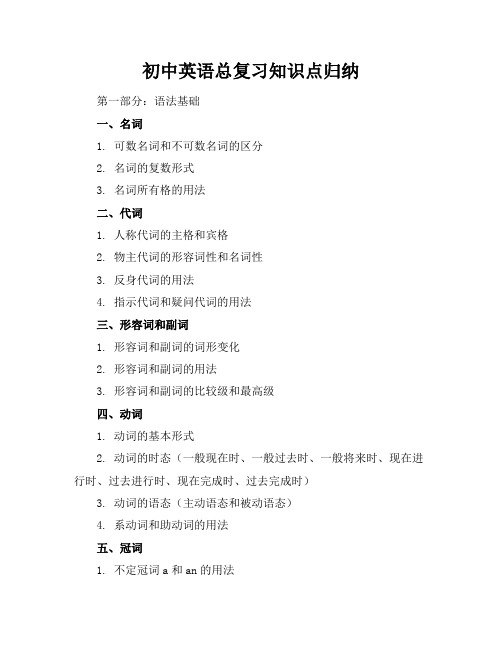
初中英语总复习知识点归纳第一部分:语法基础一、名词1. 可数名词和不可数名词的区分2. 名词的复数形式3. 名词所有格的用法二、代词1. 人称代词的主格和宾格2. 物主代词的形容词性和名词性3. 反身代词的用法4. 指示代词和疑问代词的用法三、形容词和副词1. 形容词和副词的词形变化2. 形容词和副词的用法3. 形容词和副词的比较级和最高级四、动词1. 动词的基本形式2. 动词的时态(一般现在时、一般过去时、一般将来时、现在进行时、过去进行时、现在完成时、过去完成时)3. 动词的语态(主动语态和被动语态)4. 系动词和助动词的用法五、冠词1. 不定冠词a和an的用法2. 定冠词the的用法3. 不使用冠词的情况六、连词1. 并列连词的用法2. 从属连词的用法七、介词1. 常用介词的用法2. 介词短语的结构和用法八、数词1. 基数词和序数词的用法2. 分数、小数和百分数的表达九、感叹词1. 感叹词的用法十、疑问词1. 疑问词的用法十一、句型结构1. 简单句的五种基本句型2. 并列句和复合句的结构和用法十二、主谓一致1. 主谓一致的原则2. 主谓一致的特殊情况十三、倒装句1. 完全倒装和部分倒装的区别2. 常见的倒装句型十四、省略句1. 省略句的结构和用法十五、强调句1. 强调句的结构和用法十六、虚拟语气1. 虚拟语气的用法十七、情态动词1. 情态动词的用法十八、非谓语动词1. 非谓语动词的分类和用法十九、固定搭配1. 常见的固定搭配二十、习惯用语和俚语1. 常见的习惯用语和俚语第二部分:词汇与短语一、词汇记忆方法1. 词根词缀记忆法2. 同义词和反义词记忆法3. 分类记忆法4. 联想记忆法二、常见词汇和短语1. 常用动词短语2. 常用形容词短语3. 常用介词短语4. 常用连词短语5. 常用固定搭配三、词汇辨析1. 形近词辨析2. 意思相近的词辨析3. 语境辨析四、词汇应用1. 词汇在句子中的应用2. 词汇在段落中的应用3. 词汇在文章中的应用五、词汇扩展1. 通过阅读扩展词汇2. 通过听力扩展词汇3. 通过口语和写作扩展词汇六、词汇复习策略1. 制定词汇复习计划2. 定期进行词汇测试3. 反复记忆和复习第三部分:阅读理解一、阅读技巧1. 快速阅读2. 精读3. 猜词技巧4. 理解文章主旨和大意5. 找出文章中的细节信息二、阅读题型1. 主旨大意题2. 细节理解题3. 推理判断题4. 词义猜测题5. 观点态度题三、阅读材料1. 故事类文章2. 议论文3. 说明文4. 应用文5. 新闻报道四、阅读理解策略1. 预览文章和首段2. 扫读文章找出关键词3. 仔细阅读理解文章内容4. 回答问题时注意关键词和语境5. 验证答案是否符合文章内容第四部分:写作技能一、写作技巧1. 确定写作目的和主题2. 拟定写作提纲3. 运用适当的句型和词汇4. 保持文章逻辑清晰5. 注意文章格式和标点符号二、写作题型1. 记叙文2. 议论文3. 说明文4. 应用文5. 日记和书信三、写作素材1. 人物描写2. 地点描写3. 事件描写4. 情感表达5. 观点陈述四、写作策略1. 多读优秀范文2. 多练习写作3. 请教老师和同学4. 反复修改和润色5. 保持写作兴趣和热情第五部分:听力理解一、听力技巧1. 预测听力内容2. 抓住关键词和关键信息4. 边听边记笔记5. 理解对话和独白的逻辑关系二、听力题型1. 简单听力理解题2. 听力细节理解题3. 听力推理判断题4. 听力主旨大意题5. 听力词义猜测题三、听力材料1. 对话2. 独白3. 新闻报道4. 广播节目5. 电影和电视剧片段四、听力理解策略1. 预览问题和选项2. 仔细听录音,注意关键词3. 根据听力内容进行推理和判断4. 选择最符合听力内容的答案5. 检查答案是否符合题意第六部分:口语表达一、口语技巧1. 准备话题和内容3. 保持语速适中4. 注意语法和词汇的准确性5. 保持自信和流畅二、口语题型1. 自我介绍2. 话题讨论3. 角色扮演4. 观点陈述5. 回答问题三、口语素材1. 日常生活话题2. 学校生活话题3. 社会热点话题4. 个人兴趣爱好话题5. 旅游和文化话题四、口语表达策略1. 多听多说,提高口语能力2. 模仿优秀的口语表达3. 与老师和同学进行口语练习4. 参加英语角和口语比赛5. 记录自己的口语表达,进行反思和改进第七部分:综合技能一、综合技巧1. 综合运用语法、词汇、阅读、写作、听力和口语等技能2. 注重语言的实际运用能力3. 提高语言的综合运用水平4. 培养跨文化交际能力5. 保持学习英语的兴趣和动力二、综合题型1. 完形填空2. 阅读理解3. 写作4. 听力理解5. 口语表达三、综合复习策略1. 制定综合复习计划2. 定期进行综合测试3. 反复练习和复习4. 请教老师和同学5. 保持学习英语的兴趣和热情。
英语语法知识点大全
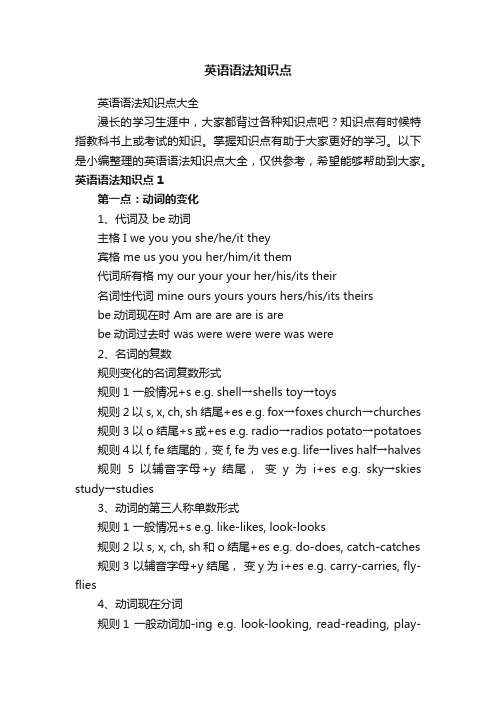
英语语法知识点英语语法知识点大全漫长的学习生涯中,大家都背过各种知识点吧?知识点有时候特指教科书上或考试的知识。
掌握知识点有助于大家更好的学习。
以下是小编整理的英语语法知识点大全,仅供参考,希望能够帮助到大家。
英语语法知识点1第一点:动词的变化1、代词及be动词主格 I we you you she/he/it they宾格 me us you you her/him/it them代词所有格 my our your your her/his/its their名词性代词 mine ours yours yours hers/his/its theirsbe动词现在时 Am are are are is arebe动词过去时 was were were were was were2、名词的复数规则变化的名词复数形式规则1 一般情况+s e.g. shell→shells toy→toys规则2 以s, x, ch, sh结尾+es e.g. fox→foxes church→churches 规则3 以o结尾+s或+es e.g. radio→radios potato→potatoes 规则4 以f, fe结尾的,变f, fe为ves e.g. life→lives half→halves 规则5 以辅音字母+y结尾,变y为i+es e.g. sky→skies study→studies3、动词的第三人称单数形式规则1 一般情况+s e.g. like-likes, look-looks规则2 以s, x, ch, sh和o结尾+es e.g. do-does, catch-catches 规则3 以辅音字母+y结尾,变y为i+es e.g. carry-carries, fly-flies4、动词现在分词规则1 一般动词加-ing e.g. look-looking, read-reading, play-playing规则2 以不发音的字母结尾的单词去e加-ing e.g. make-making, take-taking, arrive-arriving规则3 重读闭音节词结尾,即单词中只有一个元音字母,其后紧跟一个辅音字母的词,双写辅音字母再加-ing e. g. run-running, sit-sitting, get-getting, swim-swimming, stop-stopping5、动词过去式规则动词变化规则1 一般动词加-ed e.g. look-looked, watch-watched, play-played.规则2 以e结尾的加-d e.g. make-maked, arrive-arrived.规则3 以辅音字母y结尾的变y为i加-ed cry-cried, carry-carried.规则4 重读闭音节词结尾,即单词中只有一个元音字母,其后紧跟一个辅音字母的词,双写辅音字母再加-ed stop-stopped 过去式的读音在清辅音后面(除外)读/t/ e.g. walked, jumped在浊辅音和元音后读/d/ e.g. washed, watched在/t/,/d/后读/id/ e.g. waited, hated6、形容词和副词的比较级和最高级比较级规则1 一般加-er e.g. high-higher规则2 以e结尾加-r nice-nicer规则3 以辅音字母加y结尾,变y为i再加-er busy-busier规则4 重读闭音节结尾,双写辅音字母再加-er fat-fatter最高级规则1 一般加-est e.g. high-highest规则2 以e结尾加-st nice-nicest规则3 以辅音字母加y结尾,变y为i再加-est busy-busiest规则4 重读闭音节结尾,双写辅音字母再加--est fat-fattest7、常见缩写:is='s I am=I'm are='reis not=isn't /iznt/ are not=aren't /a:nt/do not=don'tdoes not=doesn'twas='sdid not=didn'tcan not=can'thave='vehas='shave not=haven'thas not=hasn'twill='llwill not=won'tshall not=shan't第二点:将来完成进行时将来完成进行时形式will/shall have been+现在分词用于第一人称,而will have been+现在分词用于其他人称。
英语语法知识大全
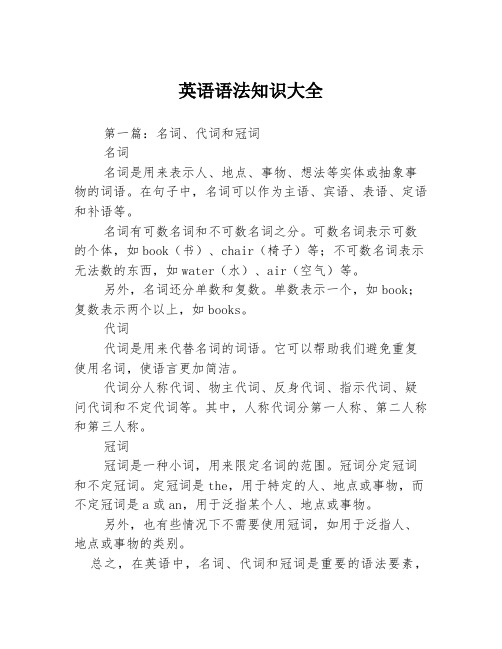
英语语法知识大全第一篇:名词、代词和冠词名词名词是用来表示人、地点、事物、想法等实体或抽象事物的词语。
在句子中,名词可以作为主语、宾语、表语、定语和补语等。
名词有可数名词和不可数名词之分。
可数名词表示可数的个体,如book(书)、chair(椅子)等;不可数名词表示无法数的东西,如water(水)、air(空气)等。
另外,名词还分单数和复数。
单数表示一个,如book;复数表示两个以上,如books。
代词代词是用来代替名词的词语。
它可以帮助我们避免重复使用名词,使语言更加简洁。
代词分人称代词、物主代词、反身代词、指示代词、疑问代词和不定代词等。
其中,人称代词分第一人称、第二人称和第三人称。
冠词冠词是一种小词,用来限定名词的范围。
冠词分定冠词和不定冠词。
定冠词是the,用于特定的人、地点或事物,而不定冠词是a或an,用于泛指某个人、地点或事物。
另外,也有些情况下不需要使用冠词,如用于泛指人、地点或事物的类别。
总之,在英语中,名词、代词和冠词是重要的语法要素,它们的正确使用可以使句子更加准确、简洁。
在学习英语时,积累正确使用这些语言要素的知识和技能是非常重要的。
第二篇:动词、形容词和副词动词动词是表示动作、状态、情感或观点等的词语。
在句子中,动词可以作为谓语、及物动词和不及物动词等。
动词还有时态、语态和语气等不同的形式。
时态表示时间关系,如现在时、过去时和将来时等;语态表示动作主体与谓语的关系,如主动语态和被动语态等;语气表示说话人的肯定、否定或祈求等心态,如陈述语气、祈使语气和虚拟语气等。
形容词形容词用来描述名词的品质或状态,如big(大)、small(小)、happy(快乐)等。
形容词可以作为定语或表语等。
形容词还有比较级和最高级之分,用于表示不同的程度或大小。
副词副词用来修饰动词、形容词或其他副词,表示时间、地点、原因、程度、方式等。
如often(经常)、well(好)、now(现在)等。
与形容词类似,副词也有比较级和最高级之分,用于表示不同的程度或大小。
中考英语重点知识总结
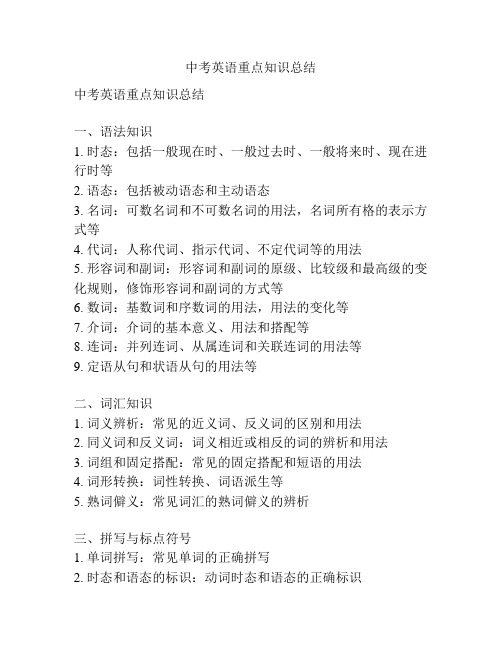
中考英语重点知识总结中考英语重点知识总结一、语法知识1. 时态:包括一般现在时、一般过去时、一般将来时、现在进行时等2. 语态:包括被动语态和主动语态3. 名词:可数名词和不可数名词的用法,名词所有格的表示方式等4. 代词:人称代词、指示代词、不定代词等的用法5. 形容词和副词:形容词和副词的原级、比较级和最高级的变化规则,修饰形容词和副词的方式等6. 数词:基数词和序数词的用法,用法的变化等7. 介词:介词的基本意义、用法和搭配等8. 连词:并列连词、从属连词和关联连词的用法等9. 定语从句和状语从句的用法等二、词汇知识1. 词义辨析:常见的近义词、反义词的区别和用法2. 同义词和反义词:词义相近或相反的词的辨析和用法3. 词组和固定搭配:常见的固定搭配和短语的用法4. 词形转换:词性转换、词语派生等5. 熟词僻义:常见词汇的熟词僻义的辨析三、拼写与标点符号1. 单词拼写:常见单词的正确拼写2. 时态和语态的标识:动词时态和语态的正确标识3. 代词和主谓一致:代词和其指代的名词在人称、数、性方面的一致4. 音标符号:英语中常见的音标和其发音规则5. 标点符号:英语中常用的标点符号和其正确用法四、阅读理解1. 主旨大意:从文章的标题、首句、尾句等来确定文章的主旨大意2. 细节理解:根据文章中的具体信息来回答问题3. 推理判断:根据文章中的暗示信息进行推理判断4. 看图作文:根据图片内容及相关提示,写一篇短文五、写作素材1. 日常生活:描述家庭、学校、饮食、运动、购物等方面的日常生活2. 人物描写:描述人物的外貌、性格、爱好等特点3. 环境描写:描写城市、乡村、风景名胜等环境的特点和感受4. 喜好与习惯:描述自己和他人的喜好、习惯和爱好等5. 事件经历:描述过去发生的一件事情或个人经历6. 情感表达:描述自己的感受、意见、建议等以上是中考英语的重点知识总结,涵盖了语法、词汇、拼写与标点符号、阅读理解以及写作素材等方面。
(完整版)英语基础语法知识大全
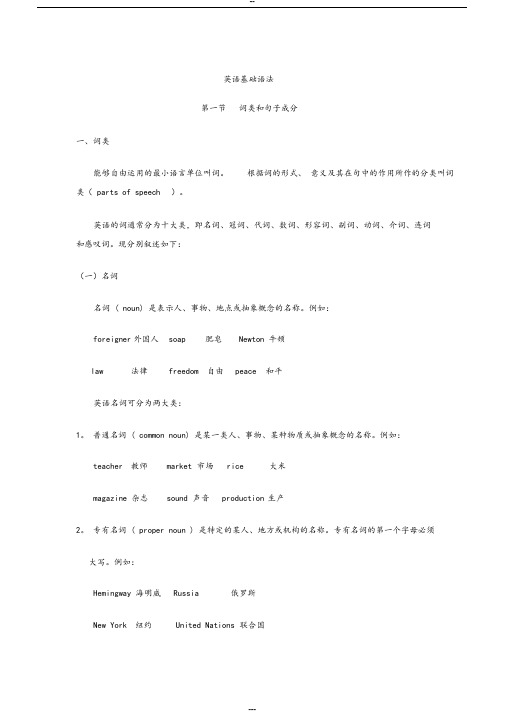
英语基础语法第一节词类和句子成分一、词类能够自由运用的最小语言单位叫词。
根据词的形式、意义及其在句中的作用所作的分类叫词类( parts of speech )。
英语的词通常分为十大类,即名词、冠词、代词、数词、形容词、副词、动词、介词、连词和感叹词。
现分别叙述如下:(一)名词名词 ( noun) 是表示人、事物、地点或抽象概念的名称。
例如:foreigner 外国人soap 肥皂Newton 牛顿law 法律freedom 自由peace 和平英语名词可分为两大类:1。
普通名词 ( common noun) 是某一类人、事物、某种物质或抽象概念的名称。
例如:teacher 教师market 市场rice 大米magazine 杂志sound 声音production 生产2。
专有名词 ( proper noun ) 是特定的某人、地方或机构的名称。
专有名词的第一个字母必须大写。
例如:Hemingway 海明威Russia 俄罗斯New York 纽约United Nations 联合国名词又可分为可数名词 ( countable noun ) 与不可数名词( uncountable noun ) 两种。
可数名词有单、复数之分。
绝大多数名词的复数形式的构成是在单数名词的后面加-s 或-es 。
例如:shop → shops 商店bus → buses 公共汽车library → libraries 图书馆toy → toys 玩具leaf → leaves 树叶英语中有一些名词的复数形式是不规则的。
例如:man→ men 男人tooth → teeth 牙齿datum→ data 数据有关名词复数形式构成的具体规则,请参阅有关的英语语法书。
(二)冠词冠词 ( article ) 放在名词之前,帮助说明该名词所指的对象。
冠词分为不定冠词( indefinite article ) 和定冠词 ( definite article ) 两种。
英语知识点大全总结

英语知识点大全总结本文旨在对英语知识点进行全面梳理,并对各个知识点进行详细的讲解和总结。
英语作为一门国际通用语言,在全球范围内得到了广泛的应用,因此对其知识点的全面了解对于学习者来说至关重要。
本文将涵盖英语语法、词汇、阅读、写作、口语等各个方面的知识点,为学习者提供全面而系统的学习材料。
一、英语语法知识点1. 名词名词是指人、事物或抽象概念的名称。
英语名词分为可数名词和不可数名词,可数名词有单数和复数形式,而不可数名词只有单数形式。
名词的所有格形式、名词的种类和名词与介词的搭配都是学习名词时需要掌握的知识点。
2. 代词代词是用来代替名词或名词短语的词语。
代词包括人称代词、物主代词、指示代词、疑问代词、不定代词等。
学习代词需要了解其在句子中的作用和用法,并注意代词的数、格、性和人称等变化。
3. 动词动词是表示行为或状态的词语。
动词有时态、语态、语气和非谓语形式等变化。
学习动词需要了解其时态的构成和用法、及物动词和不及物动词、及物动词后的宾语形式、动词的被动语态、情态动词的用法等知识点。
4. 形容词和副词形容词用来修饰名词,副词用来修饰动词、形容词或其他副词。
形容词和副词有比较级和最高级的变化形式,也可以通过加-ly构成副词。
学习形容词和副词需要了解其比较级和最高级的构成和用法、修饰词语的位置等知识点。
5. 介词介词用来表示名词或代词与其他词语之间的关系。
介词通常后面接名词短语作宾语,也可以和动词、形容词或副词搭配使用。
常见的介词用法包括时间介词、地点介词、方式介词等。
6. 连词连词是用来连接词语、词组或句子的词语。
连词包括并列连词、从属连词和状语从句连词。
学习连词需要了解其连接的对象和连接的关系,掌握连词在句子中的使用方法。
7. 冠词冠词用来限定名词的范围,包括定冠词和不定冠词。
学习冠词需要了解其在句子中的作用和用法,包括冠词的数和格的变化。
8. 语态语态是指动词所表示的动作或状态与主语之间的关系,包括主动语态和被动语态。
最全英语知识点总结
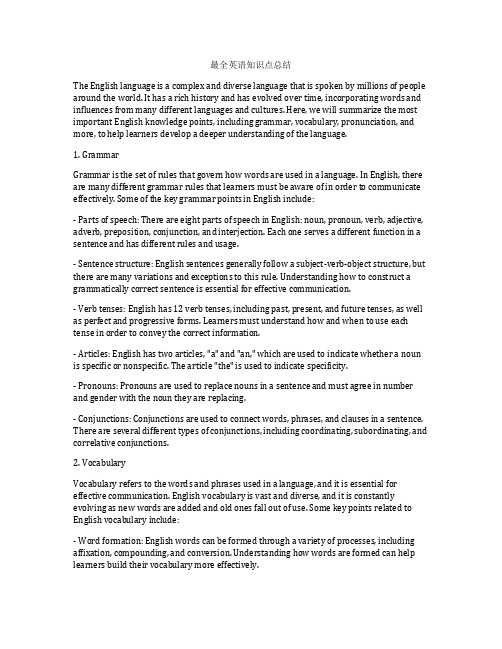
最全英语知识点总结The English language is a complex and diverse language that is spoken by millions of people around the world. It has a rich history and has evolved over time, incorporating words and influences from many different languages and cultures. Here, we will summarize the most important English knowledge points, including grammar, vocabulary, pronunciation, and more, to help learners develop a deeper understanding of the language.1. GrammarGrammar is the set of rules that govern how words are used in a language. In English, there are many different grammar rules that learners must be aware of in order to communicate effectively. Some of the key grammar points in English include:- Parts of speech: There are eight parts of speech in English: noun, pronoun, verb, adjective, adverb, preposition, conjunction, and interjection. Each one serves a different function in a sentence and has different rules and usage.- Sentence structure: English sentences generally follow a subject-verb-object structure, but there are many variations and exceptions to this rule. Understanding how to construct a grammatically correct sentence is essential for effective communication.- Verb tenses: English has 12 verb tenses, including past, present, and future tenses, as well as perfect and progressive forms. Learners must understand how and when to use each tense in order to convey the correct information.- Articles: English has two articles, "a" and "an," which are used to indicate whether a noun is specific or nonspecific. The article "the" is used to indicate specificity.- Pronouns: Pronouns are used to replace nouns in a sentence and must agree in number and gender with the noun they are replacing.- Conjunctions: Conjunctions are used to connect words, phrases, and clauses in a sentence. There are several different types of conjunctions, including coordinating, subordinating, and correlative conjunctions.2. VocabularyVocabulary refers to the words and phrases used in a language, and it is essential for effective communication. English vocabulary is vast and diverse, and it is constantly evolving as new words are added and old ones fall out of use. Some key points related to English vocabulary include:- Word formation: English words can be formed through a variety of processes, including affixation, compounding, and conversion. Understanding how words are formed can help learners build their vocabulary more effectively.- Word families: Many English words belong to families of related words, such as nouns, verbs, adjectives, and adverbs that share the same root. Understanding word families can help learners expand their vocabulary and improve their language skills.- Collocations: Collocations are combinations of words that frequently appear together, such as "make a decision" or "take a trip." Understanding collocations can help learners speak and write more fluently and naturally.- Idioms and phrasal verbs: English contains many idiomatic expressions and phrasal verbs that have specific meanings that may not be obvious from the individual words. Learning idioms and phrasal verbs is essential for understanding and using English effectively.3. PronunciationPronunciation refers to the way that words are spoken and is an essential aspect of language learning. Correct pronunciation is crucial for effective communication, and some important points related to English pronunciation include:- Phonemes: English has 44 phonemes, which are individual sounds that make up the language. Understanding and being able to produce these sounds correctly is essential for clear and accurate pronunciation.- Stress and intonation: English uses stress and intonation to convey meaning and emphasis. Understanding how stress and intonation patterns work can help learners speak more effectively and convey their intended meaning more clearly.- Silent letters and pronunciation rules: English has many silent letters and irregular pronunciation rules that can be challenging for learners. Understanding these rules and patterns can help learners improve their pronunciation and speak more fluently.4. WritingWriting is an essential skill in English, and it requires an understanding of grammar, vocabulary, and other aspects of the language. Some important points related to English writing include:- Sentence structure and punctuation: English has specific rules for sentence structure and punctuation, including the use of capitalization, commas, periods, and other punctuation marks. Understanding these rules is essential for writing clear and effective sentences.- Paragraph structure: English paragraphs have a specific structure, including a topic sentence, supporting sentences, and a concluding sentence. Understanding how to structure paragraphs can help learners write more effectively and coherently.- Tone and style: Different types of writing require different tones and styles, such as formal, informal, persuasive, and descriptive. Understanding how to adapt tone and style to different types of writing is essential for effective communication.5. ReadingReading is an important aspect of language learning, as it allows learners to expose themselves to different types of language and expand their vocabulary and understanding of grammar and usage. Some important points related to English reading include:- Comprehension: Effective reading requires the ability to understand and interpret the meaning of a text. This includes understanding main ideas, supporting details, and author's purpose.- Vocabulary development: Reading is an excellent way to develop and expand vocabulary, as learners are exposed to a wide range of words and phrases in context.- Critical thinking: Reading allows learners to critically evaluate and analyze texts, developing important critical thinking skills in the process.In conclusion, the English language is a complex and diverse language that requires an understanding of many different aspects, including grammar, vocabulary, pronunciation, writing, and reading. By developing a strong understanding of these key knowledge points, learners can improve their language skills and become more effective communicators in English. It is essential for learners to practice and engage with the language in a variety of ways, including speaking, listening, reading, and writing, in order to develop a deep and comprehensive understanding of English.。
- 1、下载文档前请自行甄别文档内容的完整性,平台不提供额外的编辑、内容补充、找答案等附加服务。
- 2、"仅部分预览"的文档,不可在线预览部分如存在完整性等问题,可反馈申请退款(可完整预览的文档不适用该条件!)。
- 3、如文档侵犯您的权益,请联系客服反馈,我们会尽快为您处理(人工客服工作时间:9:00-18:30)。
史上最全!278个英语常考知识点总结,赶快收藏!1 see、hear 、notice 、find 、feel 、listen to 、 look at (感官动词)+do eg:I like watching monkeys jump2(比较级 and 比较级) 表示越来越怎么样3 a piece of cake =easy 小菜一碟(容易)4 agree with sb 赞成某人5 all kinds of 各种各样 a kind of 一样6 all over the world = the whole world 整个世界7 along with同……一道,伴随…… eg : Iwill go along with you我将和你一起去the students planted trees along with their teachers 学生同老师们一起种树8 As soon as 一怎么样就怎么样9 as you can see 你是知道的10 ask for ……求助向…要…(直接接想要的东西) eg : ask you for my book11 ask sb for sth 向某人什么12 ask sb to do sth 询问某人某事 ask sb not to do 叫某人不要做某事13 at the age of 在……岁时 eg:I am sixteen I am at the age of sixteen14 at the beginning of …………的起初;……的开始15 at the end of +地点/+时间最后;尽头;末尾 eg : At the end of the day16 at this time of year 在每年的这个时候17 be /feel confident of sth /that clause +从句感觉/对什么有信心,自信 eg : I am / feel confident of my spoken English I feel that I can pass the test18 be + doing 表:1 现在进行时 2 将来时19 be able to (+ v 原) = can (+ v 原) 能够…… eg : She is able to sing She can sing20 be able to do sth 能够干什么 eg :she is able to sing21 be afraid to do (of sth 恐惧,害怕…… eg : I’m afraed togo out at night I’m afraid of dog22 be allowed to do 被允许做什么 eg: I’m allowed to watch TV 我被允许看电视 I should be allowedto watch TV 我应该被允许看电视23 be angry with sb 生某人的气 eg : Don’t be angry with me24 be angry with(at) sb for doing sth 为什么而生某人的气25 be as…原级…as 和什么一样 eg : Sheis as tall as me 她和我一样高26 be ashamed to27 be away from 远离28 be away from 从……离开29 be bad for 对什么有害 eg : Reading books in the sun isbad for your eyes 在太阳下看书对你的眼睛不好30 be born 出生于31 be busy doing sth 忙于做什么事 be busy with sth 忙于……32 be careful 当心;小心33 be different from……和什么不一样34 be famous for 以……著名35 befriendly to sb 对某人友好36 be from = come from 来自 eg :Heis from Bejing He comes from Bejing Is he from Bejing ? Does he come fromBejing ?37 be full of 装满……的 be filledwith 充满 eg: the glass is full of water the glass isfilled with water38 be glad+to+do/从句39 be going to + v(原) 将来时40 be good at(+doing) = do well in 在某方面善长, 善于……41 be good for 对什么有好处 eg : Reading aloud is good foryour English42 be happy to do 很高兴做某事43 be helpful to sb 对某人有好处 eg : Reading aloud is helpful to you 大声朗读对你有好处 Exercising is helpful to your bady 锻炼对你的身体有好处44 be in good health 身体健康45 be in trouble 处于困难中 eg : She is in trouble They arein tronble46 be interested in 对某方面感兴趣47 be late for = come late to 迟到 eg: Be late for class 上课迟到48 be like 像…… eg : I’m like my mother49 be mad at 生某人的气50 be made from 由……制成(制成以后看不见原材料)51 be made of 由……制成(制成以后还看得见原材料)52 be not sure 表不确定53 be on a visit to 参观54 be popular with sb 受某人欢迎55 be quiet 安静56 be short for 表**的缩写 eg: is shortfor 俊杰57 be sick in bed 生病在床58 be sorry to do sth be sorryfor sb eg : I am sorry for you59 be sorry to hear that60 be sorry to trouble sb eg : I am sorry to troubleyou61 be strict in doing sth 严于做某事 eg : He’s strict inobeying noles62 be strict with sb 对某人要求严格 eg: Some students are notstrict with them selves 这些学生对自己不严格63 be strict with sb in sth 某方面对某人严格64 be supposed todo 被要求干什么65 be sure 表确定66 be sure of doing sth 对做某事有信心 eg: He is sure of winning I am sure of learning English well67 be sure of sth 对做某事有信心 eg: I’m sure of my head (myteacher 我相信我的大脑(老师)68 be sure that sth 对做某事有信心 eg: I’m suer that he canpass the test 我相信他能通过考试69 be sure to do sth一定会做某事eg: We are sure to pass thetest 我们一定会通过这次考试 We are sure to learn English well 我们一定能学好英语70 be terrified of + 名/动doing 害怕……71 be terrified to do sth 害怕做某事72 be the same as …和什么一样73 be used to doing sth 习惯做某事 eg: My father is used to getting up early 我爸爸习惯早He isused to sleeping in class 他习惯上课睡觉74 be worth doing 值得做什么75 be(feel) afraid to do sth 害怕做某事be afraid of sth 害怕某物 be afraid that 丛句76 because+句子 because of +短语 eg : He was late because he had a headache He was late because of his headache77 begin to do = start to do 开始做某事start…with…=begin…with…以什么开始什么 eg : Let’s begin the game with the song I begin to go home78 between…and…两者之间79 borrow sth from sb 向……借……lend sth to sb ( lend sb sth 借给……什么东西 eg :I borrowed a pen from him he lent a pen to me ( he lent me a pen80 both = the same(as) = not different(from) 表相同81 bother 打扰 bother sb to do sth eg : I’m sorry to bother you ,but can you tell me to way to the station 我十分道歉打扰你,但是你能告诉我怎么去车站the problem has been bothering me for weeks 这个问题困扰了我几个周了He’s bothering me to lend him money82 by the end of 到……为止83 callsb sth eg : We call him old wang84 care 关心 eg : Don’t you care about this country’s future ?你为什么不关心国家的未来85 catch up with sb 赶上某人86 chat with sb 和某人闲谈 take sb to + 地点带某人去某地87 come in 进88 come over to 过来89 come up with 提出 eg: Can you come up with a good idea你能想出一个好办法吗?90 communicate with sb 和某人交流91 consider + doing 考虑做什么 eg : Why not consider going to lu zhou 为什么不考虑去?92 dance to 随着……跳舞 eg : Shelikes dancing to the music 她喜欢随着音乐跳舞93 decide to do sth 决定做某事94 do a survey of 做某方面的调查95 do better in 在……方面做得更好96 do wrong 做错97 Don’t forget to do sth 不要忘了做某事98 Don’t mind +doing /从句 /名词不要介意……99 each +名(单)每一个…eg : Each student has many books 每一个学生都有一些书100 end up +doing101 enjoy +doing喜欢102 escape from 从……逃跑eg: Theprisoners have escaped from the prison犯人从监狱里逃跑出来103 expect to do sth 期待做某事104 fall down 摔下来 fall off 从哪摔下来105 fall in love with sb/sth 爱上什么106 far from 离某地远 eg : The school is far from my home107 find +it +adj +to do 发现做某事怎么样108 find sb/sth +adj 发现什么怎么样 eg : I find the bookinteresting109 finish 完成+doing(名词)110 fit to sb = be fit for sb 适合某人111 forget to do 没有做而忘了 forget doing 做了而又忘了 eg: Don't forget to gohome I forget closing door112 from…to…从某某到某某 eg: Fromme for her113 get /have sth down 做完,被(别人)做…eg: I have my hair cut我理了发(头发被剪了) Tom got his bad tooth pulled out 汤母把他的坏牙拔掉了(被牙医拔掉了)114 get a part-time job= find a part-time job115 get along well with sb = geton well with sb 与某人相处得好116 get along with sb = get on with sb 与某人相处117 getready for = be ready for为什么而准备eg : I get ready for mathI am ready for math 118 get sb in to trouble 给某人麻烦119 get sb to do sth120 get…from…从某处得到某物121 give a talk 做报告 eg: He is give a tall122 give sth to sb give sb sth 给某人某物123 go fish 钓鱼 go swimming 游泳124 go on to do 去做下一件事 go on doing 继续做这件事125 go out away from go out of126 go to school 上学(用于专业的)go to the school 去学校(不一定是上学)127 good way to 好方法128 hate to do 讨厌没做过的事 hate doing 讨厌做过的事129 have a party for sb 举办谁的晚会130 have a talk 听报告谈一谈131 have been doing 现在完成进行时 eg : You have been talkingYou have been sleeping since 132 have been to …( 地方)……去过某过地方have gone to …(地方) 去了某地还没回来133 have fun +doing 玩得高兴134 have sth to do 有什么事要做 eg: I have a lot of homework to do 我有很多家庭作业要做 I havenothing to do 我没什么事情做135 have to do sth 必须做某事136 have trouble (problem) (in) doing sth 做什么事情有麻烦137 have…time +doing138 have…(时间)…off 放……假 eg: I have month off 我请一个月得假139 hear sb +do/doing 听见某人做某事/正在做某事140 help a lot 很大用处141 help sb with sth \one’s sth 帮助某人某事(某方面) help sb(to) do sth 帮助某人做某事142 hope to do sth 希望做某事143 How about(+doing) = What about(+doing)144 how do you like = what do you think of 你对什么的看法145 if : 是否=wether eg: I don’t know if (wether) I should go to the party 我不知道我是否应该去参加晚会He don't know if (wether) we will arrive on time tomorrow morning 他不知道我们明天早上是否能准时到达146 if :如果,假如(全部接一般时态)+条件语态从句 eg: I’ll go to LuZhou if it does’t rain 假如明天不下雨,我就去If they change the plan they will let me know 假如他们要改变计划,他们会让我知道的I'll go to England ,if I have enough money next year 如果我明年由足够的钱,我就要去英国147 in one's opinion = sb think 某人认为148 in some ways 在某些方面149 in the end = finally(adv) 最后150 in the north of…什么在什么的北方 (north 北 sowth 南 west 西 east东 )151 in the sun 在太阳下152 increase 增加 eg : They’ve increased the prece of petrol by 3% 他们把石油价增加了3% the population has increased from 12 million ten years ago to 18 million now 153 instead of +(名 ) 代替 eg: I’d like an apple instead of a pear 我想要苹果,而不要梨子 I like English instead of math 我喜欢英语而不喜欢数学154 introduce sb to sb 介绍某人给某人 introduce oneself 自我介绍155 invite sb to do sth 邀请某人做某事156 It takes sb sometime to do sth 做某人花掉某人多少时间 eg : It took me 5 minutes to do my homework It takes me half an hour to cook157 It's +adj +for sb to do sth 对某人来说做某事怎么样158 It's +adj +to do 做某事怎么样159 It's +adj for sb 对于某人来说怎么样 It's +adj of sb 对某人来说太怎么样160 It's +adj(for sb) to do(对某人来说) 做某事怎么样 It's +adj ofsb to do sth 对某人来说做某事太怎么样 eg : It's nice of you to help me with my English161 It's a good idea for sb to do sth 对……来说是个好主意162 It's important to sb 对某人来说很重要 eg: It's important tome163 It's time to do sth It’s time for sth 到了该去做某事的时间 eg : It's time to have class It’s time for class 该去上课了164 join = take part in 参加165 just now 刚才166 keep +sb /sth +adj /介词短语让什么保持什么样?167 keep out 不让……进入168 keep sb adj 让……保持…… eg: Iwant to keep my mother happy keep healthy 保持健康169 key to +名词表示:某物的钥匙或某题的答案170 key to… anser to … key 可以是答题或钥匙171 laugh at…取笑…… eg : Don't langh at others Welanghed at the joke172 learn by oneslfe 自学173 learn from sb 向某人学习 eg: We should learn from LeiFeng174 learn to do sth 学做某事175 let sb do sth 让某人做某事176 Let sb down 让某人失望 eg : Weshouldn't let our farents down 我们不应该让我们的父母失望177 live from :离某地远178 live in +方 /at +小地方居住在某地eg: I live in LuZhou She lives at XuanTan 179 look after = take care of 照顾照看180 lose one's way 谁迷路 eg : Lose your way 你迷路181 make a decision to do sth 决定做某事182 make friends with sb 和谁成为朋友 eg : I want to makefriends with you183 make it early 把时间定的早一点184 make on exhibition of oneself 让某人出洋相185 make sb /n +n 使什么成为什么 eg : I made her my stepmoller I made you my wife 186 make sb /sth +adj 使某人(某物)怎么样 eg : You must madeyour bed clean187 make sb /sth adj 使某人/某物怎么样188 make sb do sth 让某人做某事 eg : I made him write 我以前让他写189 make up be made up of (被动语态)由……组成190 make…difference to…191 mind sb to do mind one's doing 介意……做什么192 most +名 most of +代193 much too +形容词194 must be 一定195 need +名词196 need sb do sth 需要某人做某事197 need to do (实义动词) need do (情态动词)198 no /neithr of hate to do no /neithr of hate doing199 no +名词200 not anymore = no more 再也不…… eg: He didn't cry anymore He cried no more 他再也不哭201 not… (形、副)at all eg: He’s not tall at all she doesn't junp far at all202 not…at all 一点都不203 not…either 表否定,也不 eg : I don't japanse either Idon't have sister, either 我也没有姐姐204 not…until 直到……才…… eg: I didn't sleep until my mother came back The child didn't stop crying untilI give her sugar205 offer / provide sb with sth 给某人提供206 offer sb sth ( offer sth to sb 提供什么东西给某人 eg : Ioffer you water (I offer water to you 我给你提供水207 on one's way to…在谁去那的路上208 on the one hand 一方面 on the other hand 另一方面209 on the phone = over the phone 用交谈210 on time 准时 in time 及时211 one day =some day =someday 一天,有一天212 one of +可数名词的复数形式213 one to another 一个到另一个214 over and over again 一遍又一遍215 say to oneself 对自己说216 please +do217 please hepl yourself218 part-time job 兼职工作 full-time job全职工作219 please with sb.220 pool into = pore into221 practice +doing222 prefer sth.to sth. 相对... 更喜欢223 pay for224 rather ...than 宁可....也不225 regard ... as 把.... 当作226 remind sb. about sth.227 remind sb. of sth.228 return sth. to sb.229 pretend to do sth. 装着去做什么230 say to sb. 对某人说231 sb. spend some money on sth. 花了多少钱在某事上232 sb. spend sometime with sb. 花了多少时间陪谁233 sb. spend sometime (in) doing sth.234 sb. with sb. +is sb and sb +are235 see sb do236 seem to do/be +adj. 显得怎么样237 send + sb sth238 send ...to ...239 shock 使... 震惊240 show sb sth241 show sb sth =show sth to sb242 show sth to sb243 some ... others 一些... 另一些244 start .. with... begin ...with..245 stay away from 远离246 stop doing 停下正在做的事247 stop to do sth 停下来正在做的事去做下一件事248 stop sb from doing sth 阻止某人做某事249 stop sb(from)dong 阻止某人做某事250 such +名251 suit sb 适合某人252 surprise sb253 take classes254 take sb to255 take walks=take a walk= go for a walk256 talk to257 talk of258 talk with sb259 tell sb to do sth260 tell sb not to do sth261 tell a lie262 teach sb sth263 tell ... from..264 thank you for doing265 the same +名词(doing)+as...266 the same ...(名)...as267 the way to do sth=the way of doing sth268 the way to ...(地点)269 too.. to270 transalte ... into...271 travel with sb272 try to do sth 想干什么但没成功 try doing sth 想干什么,已经做过了273 try one's best to do sth 尽某人最大的努力274 try ... 试衣服 have a try 试一下275 turn down 开小 turn up 开大276 turn off 关上 turn on 打开277 upsidde down 倒着278 visit to 参观某个地方。
